Double take
Diving deep to achieve sustainable progress

fabric trenDs
sleeper trains
reDucing waste
sustainable cruising
March-May 2023 Issue 93
Celebrating 30 Years of Partnership
Celebrate. Collaborate. Innovate. Now more than ever, Linstol remains committed to serving as your purveyor of choice for passenger comforts and luxurious travel experience amenities. We provide these enhancements seamlessly in alignment with your highest expectations.
INSPIRED PASSENGER EXPERIENCES
Bespoke products influenced by practical knowledge and understanding

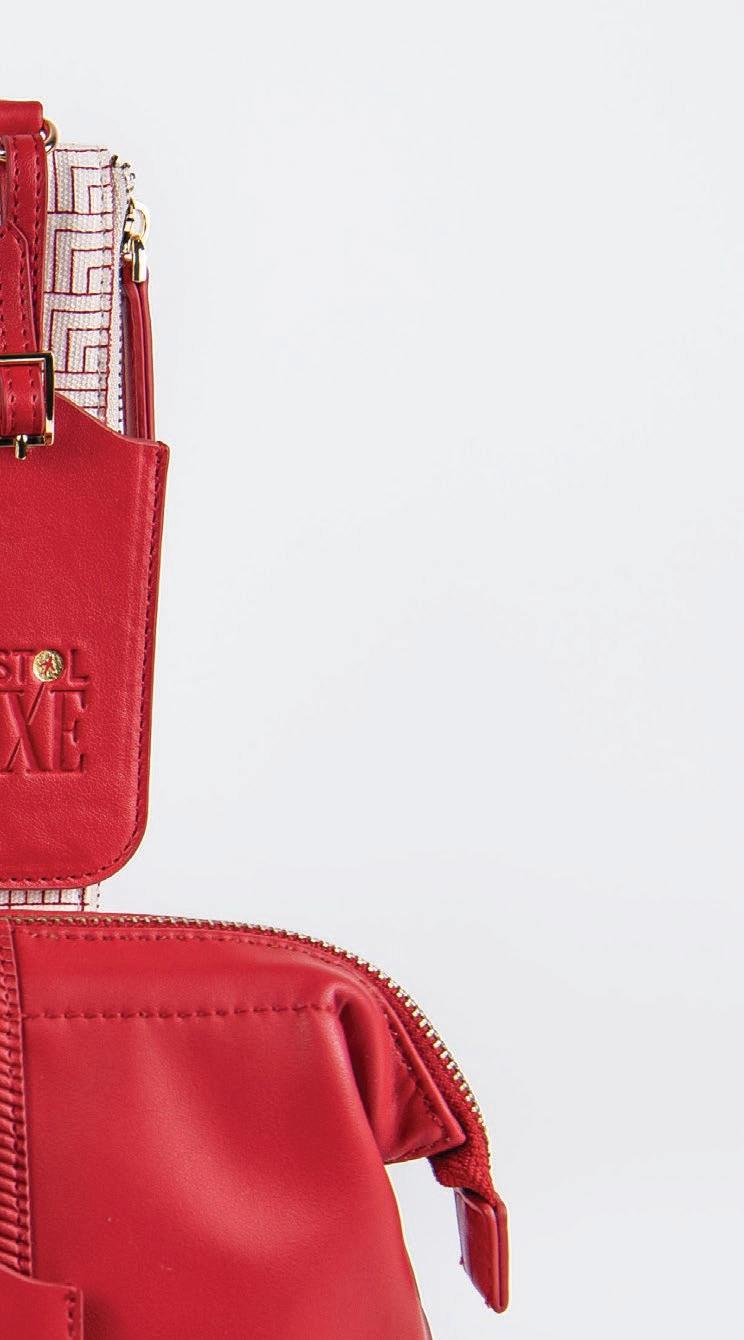

CLEVER THOUGHTFUL DESIGN

Linstol designs custom products specifically for the airline industry


COLLABORATIVE PARTNERSHIPS
Fostering creative relationships drives imagination and innovative ideas
Linstol.com









































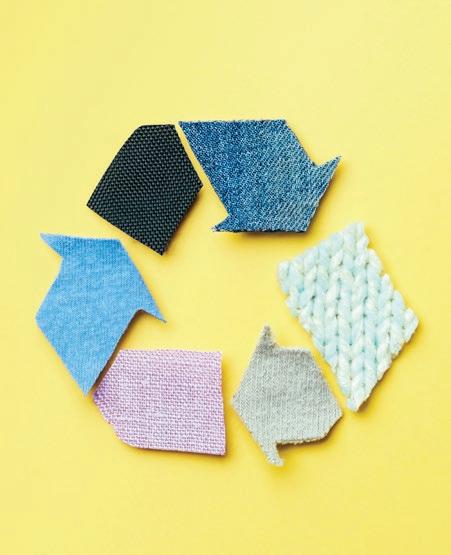



Inside this issue... 03 Features 6 Thoughtful flying: Airline sustainability 18 Recruitment: Considering sustainability 21 Sustainable trends: Fabrics 24 In Conversation: Watermark 26 Airline challenges: Issues to address 32 Cruising: Sustainable trends 36 The burning issue: International cabin waste 40 On track: Night trains 44 Retail: Sustainaholics Quick reads 10 Circularity: The Airline Sustainability Forum 12 All change: Rail catering 15 Take your pick: Alcoholic drinks 16 Focus on: Castello Monte Vibiano 35 Focus on: Ambassador Cruise Line 42 Focus on: Diversey Regulars 47 Industry update 50 Events 12 10 21 32 6 44 18


EDITORIAL
EDITOR
Stuart Forster stuart.forster@onboardhospitality.com

DIGITAL EDITOR
April Waterston april.waterston@onboardhospitality.com
CONTRIBUTING EDITORS
Jo Austin (For Taste of Travel enquiries: jo.austin@onboardhospitality.com), Julie Baxter (julie.baxter@onboardhospitality. com) Bev Fearis & Jessica Pook
CONTRIBUTORS


Matt Crane
Anne de Hauw
Mike Pooley
Roger Williams
EDITORIAL DIRECTOR
Steve Hartridge
PUBLISHER
Sue Williams sue.williams@onboardhospitality.com
ASSOCIATE PUBLISHER

Craig McQuinn craig.mcquinn@onboardhospitality.com
DESIGN & PRODUCTION
DESIGNERS
Caitlan Francis & Emma Norton
PRODUCTION & STUDIO MANAGER

Clare Hunter
PRODUCTION ADMINISTRATOR


Steve Hunter
BMI PUBLISHING
MANAGING DIRECTOR
Matt Bonner CEO
Martin Steady
SUBSCRIPTIONS
Kay Fisher subscriptions@bmipublishing.co.uk
(PRINT) ISSN 2046-2042. ©BMI PUBLISHING LTD 2020. ONBOARD HOSPITALITY IS PUBLISHED BY BMI PUBLISHING LTD: 501

THE RESIDENCE, NO. 1 ALEXANDRA TERRACE, GUILDFORD, GU1 3DA, UK. T: 020 8649 7233
E: ENQUIRIES@BMIPUBLISHING.CO.UK
BMIPUBLISHING.CO.UK
WHILE EVERY EFFORTIS MADE TO ENSURE

ACCURACY, BMI PUBLISHING LTD CANNOT BE HELD RESPONSIBLE FOR ANY ERRORS OR OMISSIONS.



COVER IMAGE: ISTOCKPHOTO.COM/ CHAIYAPRUEK2520
Regularly read in over 70 countries worldwide and mailed to our 25,000+ international database. Read this magazine in digital form, share it virtually or subscribe. If you are looking for a supplier or caterer, check out onboardhospitality.com/finder



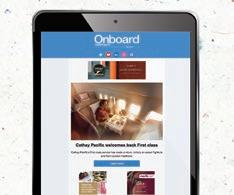
Get yourself connected online @OBHMagazine

� Onboard Hospitality at linkedin.com
Embracing change
A























In this edition, we head to Italy to learn how the Castello Monte Vibiano estate started making changes to become sustainable 25 years ago. And we stay in Europe to find out why sleeper trains are resurgent before looking at trends relating to sustainability in cruising.
Meanwhile, we have received more than 150 entries for the 2023 Onboard Hospitality Awards. Thank you to everyone who has submitted an entry and best wishes to all of you who are in the running for an award. And here's to everyone involved in making and facilitating the changes which are helping to make travel more sustainable.
I hope you’ll enjoy this issue.
Looking ahead...
RECOGNISING EXCELLENCE, RESILIENCE AND INNOVATION IN AIR, RAIL, CRUISE AND FERRIES onboardhospitality.com/awards





STAY SOCIAL Connect with us on our social media channels. Follow us on Twitter, Instagram and LinkedIn. Follow the conversation via the hashtags #onboard and #OBHAwards.


onboardhospitality.com

CURRENT For the latest news and features, don't miss Onboard Hospitality Weekly, our weekly e-newsletter. Get it sent to your inbox every Monday. onboardhospitality. com/subscribe ADVERTISE WITH US See your advert feature in

MEET
See you in Hamburg for the World Travel Catering and Onboard Services Expo (WTCE) and Airccraft Interiors Expo (AIX) from 6-8 June 2023.


WELCOME / 5
AWARDS VOTING
Vote in the Onboard Hospitality Awards until March 24 2023. Winners will be announced at the WTCE in Hamburg, Germany, on June 6 2023. awardsonboard hospitality.com IN HAMBURG
Contact: Stuart Forster
@OBHMagazine
As our cover symbolises, the changes which passengers can see and experience are merely the tip of the iceberg. There's lots more going on that will have positive long-term impact. That ranges from choices of ingredients and materials, considering sustainability during recruitment to reassessing how to deal with issues such as International Cabin Waste.
Stuart Forster EDITOR Onboard Hospitality
STAY
our next edition — distributed at the WTCE. Talk with one of our sales team about opportunities. Contact:
Craig McQuinn or Sue Williams
From reducing food waste to eliminating plastic onboard, its all systems go for airlines to boost their sustainable credentials. April Waterston checks out the latest progress






Whilst flying has long been lauded as a key contributor to climate change, it is also the key to explore our wonderful, wonderful planet. Travel is what allows us to become global citizens. By travelling we feel more engaged with global politics, more aware of hardships people face around the world, and increasingly more appreciative of the natural beauty and ecosystems we so desperately need to protect.
However the fact remains that reducing the carbon footprint and overall environmental impact of aviation is essential. We all know by












now that the aviation industry is widely reported as contributing anywhere between 2-2.5 per cent of total carbon emissions globally. Airlines know they need to up their game to help us all travel more sustainably – a task they are all, for the most part, taking very seriously.
“Flying sustainably and cutting CO2 emissions is a top priority," said Frederic Leger, IATA’s Senior Vice President for Commercial Products & Services. "The aviation sector is working to achieve net zero emissions by 2050."

"Iberia has always been committed to both environmental and social sustainability," said Melanie Berry, Customer Experience Director at

6 / SUSTAINABLE AIRLINES onboardhospitality.com ISTOCKPHOTO.COM/ MAN AS THEP
Iberia. A more sustainable experience for its passengers is one of the pillars of Iberia’s sustainability strategy. “In 2018, we launched the LIFE Zero Cabin Waste programme to recycle the waste generated onboard on all our flights thanks to new catering carts that facilitate the separation of plastic, paper and composite beverage containers, which later is collected by the catering supplier and delivery to recycling companies. In 2019, a total of 2,253 tonnes of used food and drink containers were recycled, representing a 42% increase compared to the amount recycled before the project began.
“In addition, in 2019, several initiatives to reduce single-use plastics were launched, such as the use of paper instead of plastic for wrapping blankets and duvets, the removal of plastic wrapping for headphones and amenity kits, the replacement of plastic straws with bamboo and paper ones. These initiatives, among others, have allowed Iberia to reduce by 68.5 tonnes yearly the plastic used onboard.”









Inflight service



Emirates is also focussing on inflight service to boost its sustainable credentials.

"Every single one of the 50,000 to 60,000 items on each Emirates flight is carefully sourced – including the meals served, toiletries, safety equipment and bed linen," said Richard Jewsbury, Emirates Divisional Vice President in the UK. "We make careful decisions about what items we purchase, how we source them, how we manage the disposal of waste, and how we consume water and power. We prioritise suppliers that are ethical and sustainable, while also offering good value and quality.
"Where feasible, we source from in and around the region to keep a low carbon footprint, such as our 30-year partnership with Dilmah Tea. Dilmah’s tea bags are made from natural sources and are compostable. We are proud to serve its teas in all cabin classes, on all our flights."
Up in the air


If the Onboard Hospitality Awards 2023 are anything to go by, it is clear that sustainability is once again at the top of the agenda for airlines. This year our Best for Sustainability Onboard category has by far the most entries of any of










our onboard categories. Vote for your favourites at awards.onboardhospitality.com by March 24 2023, and read all about them in our next issue. In the meantime, here we outline a few recent initiatives…
Alaska Airlines: Alaska Airlines has recently become the first US airline to remove all plastic cups onboard – a move which eliminates more than 55 million plastic cups annually and replaces them with a more planet-friendly alternative.



All inflight beverages on Alaska flights are now served in Forest Stewardship Council (FSC) certified paper cups or reusable glassware for most First-Class services.
Japan Airlines: Japan Airlines (JAL) is now offering passengers the option to skip its inflight meal service all together in order to reduce food waste. The option to select ‘no meal’ is available to passengers in all classes and is offered in an alert during the booking process. Although the fare is not reduced, JAL donates savings to school meal programmes in developing countries.
Finnair: At the end of February, Finnair said goodbye to its inflight retail service. “Onboard and pre-order shopping has become a less important service among our customers,” explained Valtteri Helve, Head of Product Offering at Finnair. “In spring 2020, we announced that we were discontinuing inflight sales on our flights within the EU as part of our goal to reduce the overall weight of the aircraft and now it is time to take the next step and discontinue them worldwide.”
JetBlue: WESSCO International partnered with JetBlue Airways and Wanderfuel, a wellness brand, to create a sustainable amenity kit collection for its Mint cabins that features certified B Corp wellness brands, aimed at supporting self-care for travellers.
onboardhospitality.com SUSTAINABLE AIRLINES / 7
We prioritise suppliers that are ethical and sustainable, while also offering good value and quality
The collection includes eco-friendly and sustainable products from brands including Sun Bum, Sustain Natural and EO.
























SWISS: SWISS has partnered with Retail inMotion to reduce foodwaste onboard. The Swiss Saveurs To-Go concept allows passengers on an aircraft’s last flight of the day to purchase a surprise bag filled with daily made artisanal Sprüngli products at a discount of up to 60%. Through this programme, Swiss has successfully eliminated waste for 21,000 products or 3.5 tons of food waste inside the last 10 months.
LATAM: During 2022, LATAM reduced plastic onboard by 77% by switching to bamboo mixers, rotable bags, paper ribbons wrapping blankets and pillows, sugar cane caps and by introducing a new amenity kit. It has also launched a ‘Recycle your Journey’ programme, allowing the airline to recycle waste collected onboard in domestic flights, setting aside aluminium, glass and plastic.

Aer Lingus: In 2022 Aer Lingus replaced plastic cutlery packs with packs made from birch wood, a sustainable material, resulting in a reduction of almost 23 tonnes of single use plastics per year. It also introduced a digital alternative to newspapers and magazines onboard, resulting in a saving of 14 tonnes of paper per year.









Delta Air Lines: Delta has partnered with a Mexican apparel brand called Someone Somewhere to create the amenity kits for its premium Delta One cabin. Someone Somewhere is a Certified B Corporation and Delta’s
partnership with the brand has created jobs for more than 250 people in five of Mexico’s most vulnerable states. The amenity kit, supplied by FORMIA, eliminates five single-use plastic items such as zippers and packaging, reducing plastic use by up to 90,000 pounds on an annual basis.


Emirates: Emirates’ Economy Class amenity kits are reusable and made from washable kraft paper and contain durable travel essentials made from environmentally-friendly materials such as rice paper, wheat straw and rPET (recycled polyethylene terephthalate).

airBaltic: airBaltic is working towards the goal of having one of the most sustainable fleets of Airbus A220-300 aircraft. In 2022, the company received seven Airbus A220-300 aircraft, becoming one of the largest operators globally and largest operator in Europe of this aircraft type. airBaltic currently has 39 aircraft of this type in its fleet and is expected to add eight more in 2023 •



8 / SUSTAINABLE AIRLINES onboardhospitality.com
Find JetBlue, LATAM, SWISS and more in this year's Onboard Hospitality Awards


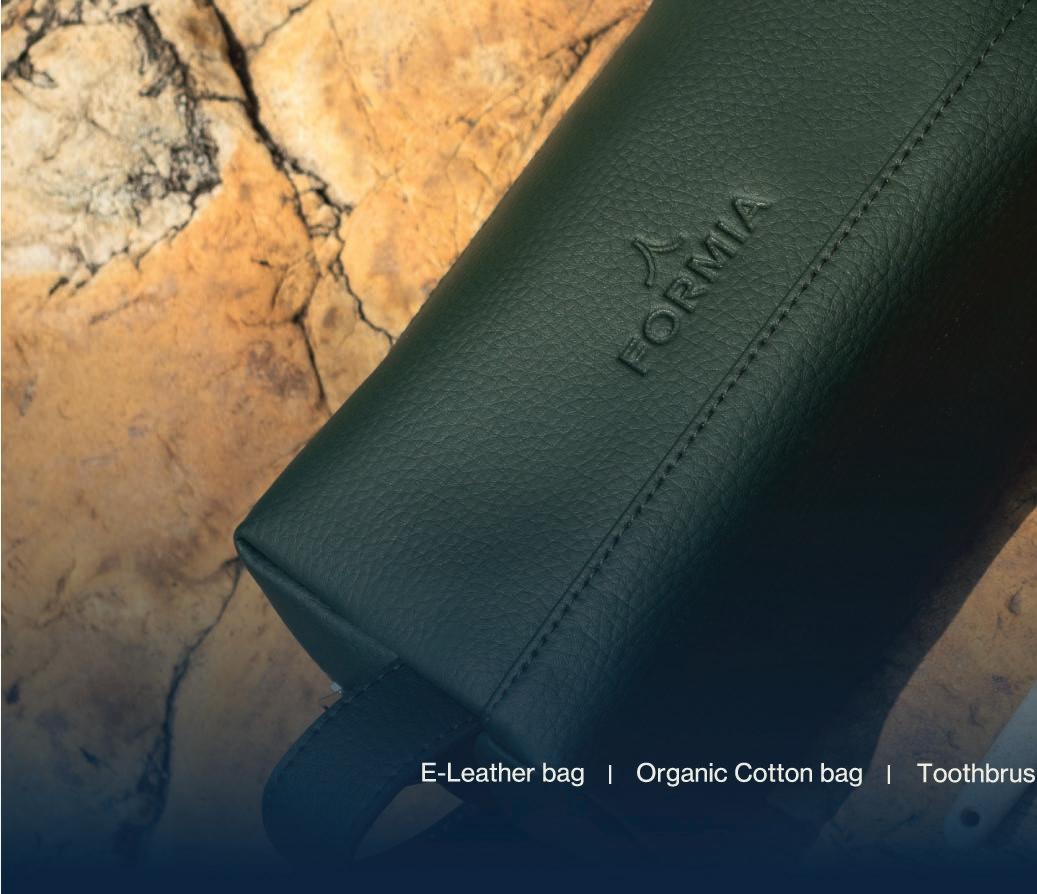




Working together
to improve circularity


































Matt Crane, one of the Founders of the Aviation Sustainability Forum, introduces the not-for-profit organisation aiming to rethink circularity and waste management…
Each year the equivalent of around 260 A380s of International Catering Waste (ICW) is incinerated around the world. Something must be done. Current legislation dictates that as soon as food and beverage waste crosses international borders it is regarded as potentially hazardous and must be incinerated or sent to landfill. Globally, the burning and burying of cabin waste is contributing to increased carbon emissions and is having a devastating, long-term impact on the environment. As passenger numbers rise, this problem will only get worse and more challenging to resolve.
In aviation, we face a tougher journey than most industries to hit net zero targets. Rightly, there is a lot of focus and effort to drive developments in fleet modernisation, Sustainable Aviation Fuel (SAF) and operational efficiencies.
Seeking new solutions




Yet to achieve net zero we also need to focus on cabin waste and circularity. That means looking across the sector’s entire and fragmented supply chain for new solutions to become more sustainable. Product suppliers, caterers, airlines,










airports and waste management companies – all of us – have a key role to play in striving to reduce the consumption of valuable resources, to reduce waste going to landfill or incineration.
No longer can we look only at ‘our piece’ – we have to look at the whole community. We are already looking upstream and finding more sustainable materials, production processes and waste reduction practices. But if we look downstream and see only incineration or landfill, what is it all for?









The issue of ICW

























































































As we get closer to net zero deadlines, the treatment of ICW has to be tackled. To do that, we must take collective ownership of a complex issue that involves outdated regulation.
To truly become more circular, we must come together as an industry and solve the ICW
10 / AVIATION SUSTAINABILITY FORUM
problem. With so many stakeholders and differing regulatory frameworks around the world, that represents a daunting task.









We must unpick this and reorganise the supply chain to operate in a more sustainable way. That can be achieved with clear objectives and guidance. The Aviation Sustainability Forum (ASF) is here to facilitate and support that essential change.
The ASF

































































































The ASF is a not-for-profit organisation and aims to enhance circularity in aviation. Consisting of a collaborative partnership of otherwise competing stakeholders from across the aviation sector, the ASF is an independent body whose mission is to unite the supply chain and build a more sustainable future for onboard products and services. Run by its members for the good of the overall inflight sector, the ASF will work with the industry to transform how ICW is managed across the supply chain by embracing circularity. Collaboration across the global aviation supply chain is essential to mitigate the issue of ICW.
The ASF will strive to bring members from the inflight services industry together to develop sustainable solutions and standards while campaigning to overcome the regulatory and policy barriers currently hindering progress. Looking at other international industries which have managed to
achieve this, such as the construction industry, there is much to learn from introducing standardisation. Standardising the materials loaded onboard aircraft will enable the standardisation of waste management practices at the end of the supply chain.











Where we are








The current regulatory framework is based on protecting the agricultural sector, with respect to animal health. So in order to challenge the regulations, the industry will need to demonstrate that new practices result in safe waste that negates regulatory concerns and can be reused, recycled, biodegraded or composted. We need to come together as an industry and recognise that this is a problem shared by all of us in the supply chain. The only way to really solve it is to work together.
Funding change









The ASF is building membership from within the aviation sector and has received seed funding from early members. Further funding will be sought from growing the membership of the ASF as well as seeking opportunities that lie outside of the sector.
Our funding will be put to use further analysing the current situation and then establishing regional pilot schemes to trial new and improved ways of working. The ultimate aim is to transform the supply chain to operate in a more sustainable way.
The issue of ICW cannot be ignored any longer. The time has come for action. That action has to come from all of us in the inflight supply chain – working together in a truly collaborative process. Let’s get started.
For more information on how you can get involved, please contact the ASF via info@ aviationsustainabilityforum.com or visit our website, aviationsustainabilityforum.com •
AVIATION SUSTAINABILITY FORUM / 11
onboardhospitality.com
In aviation, we face a tougher journey than most industries to hit net zero targets
Allonchange trains
















Rail’s journey of environmental progress has seen dirty diesels replaced with clean electric engines and lithium battery trains. CO2emission-free services are now operational in Germany in world-leading Alstom Coradia iLint’s hydrogen-powered trains. Accounting for only 1.4% of emissions around the world caused by domestic travel, rail is considered the sustainable travel choice according to Railway Gazette’s COP26 report. But does that give rail caterers a green light to rest on their environmental laurels?
Debated recently between IRCG members, everyone agreed that change was needed. Yet some were further ahead than others, partly due to national politics – not all countries see the same imperative.

Our 2022 member survey showed over 85% of rail catering managers agree that improving economic performance can be achieved through sustainable initiatives. That’s a sharp rise from 60% in 2021.
That’s a critical motivator for caterers still under post-Covid pressures of staffing gaps, rising supply costs and reduced product availability. A switch towards menu and ordering digitalisation is a key recent development.



Waste solutions
Reducing waste remained the top target. That involves reducing packaging, improving waste segregation and eliminating single-use plastic. Increasing digital touchpoints for customers to drive sales and improve forecasting was seen as vital.
With many intercity railways offering walk-on walk-off services, food quantities for individual trains must be estimated. Add in last-minute train changes, refrigeration failures and short turnarounds and food waste costs become significant.
Rhetoric about railways supplying tonnes of food to charities appears commendable, but food waste needs addressing at source. Across the world’s railways it costs millions and much is avoidable if customer pre-ordering systems are improved.
Global railway and airport caterer RG SSP reports a third of meals served are now plantbased. That helps reduce methane emissions and needs to be better reflected in some onboard menus.
RG SSP’s new digital food ordering systems, such as that used on Lumo trains in the UK, means customers can pre-order food from branded outlets such as M&S Simply Food at

onboardhospitality.com XXXXX
The International Rail Catering Group’s chair, Roger Williams, tracks sustainable progress and solutions on the railways…
12 RAIL CATERING ISTOCKPHOTO.COM/ T:FILO
the station for delivery direct to the train. This provides wider choice and, importantly, reduces waste. Could this excellent concept be the answer for walk-on walk-off trains, especially where onboard facilities are limited?
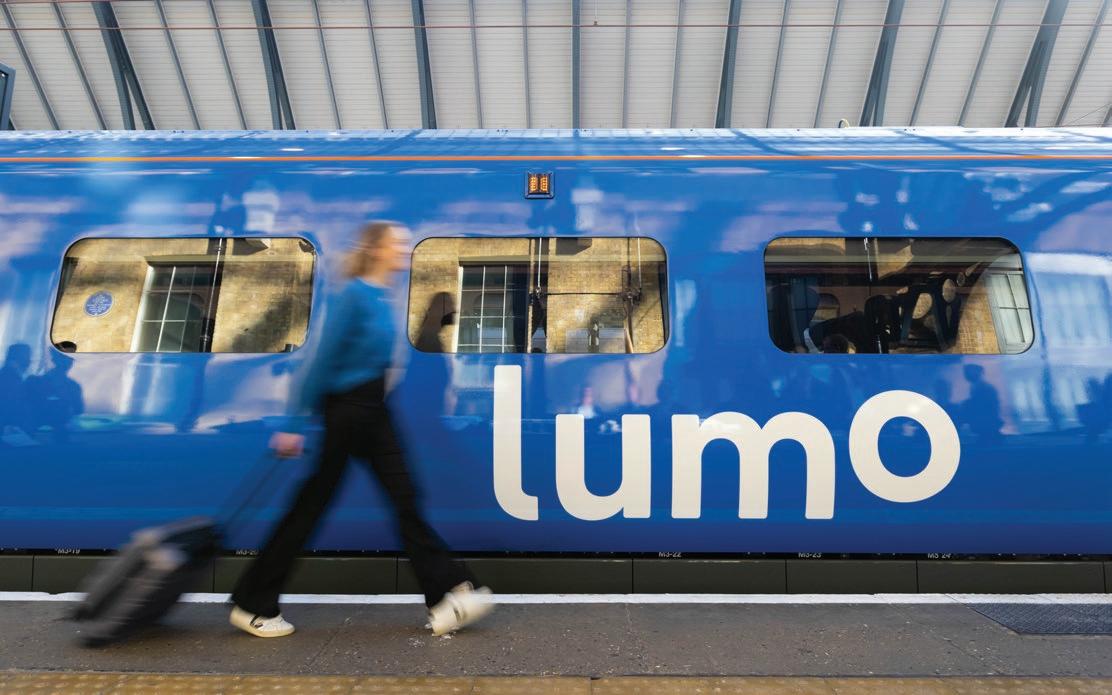
Think global, act local
In the race to be seen to be as responsible, it is important that operators don’t fall into the greenwashing trap by saying something is sustainable when it’s not.
There’s growing focus on increasing local products. Supporting local suppliers is great, but it defeats the object if the ‘local’ products have to travel hundreds of miles to a distribution depot and back to the station logistics centre for issue to trains.
Swiss caterer, Elvetino, demonstrates well how a truly local supply option can work – bakeries close to stations on the route deliver products directly. The key is accepting that perhaps not all products will be identical across a long route. With digital systems that can be easily managed.
Green intentions
In the UK, Avanti West Coast’s holistic approach was inspired by COP26, which was held in Glasgow, on its route. It aims to be a net-zero carbon emissions railway by 2031, delivering diversity and equality for employees, sustainable digital solutions for customers and support for local communities.
Elsewhere, newly rebranded Eurostar, operating in western Europe, achieved the Sustainable Restaurant Association’s highest 3-star rating for its menus. Targeting 100% renewable energy by 2030, Eurostar composts food waste into fertiliser, a process that also generates electricity. In the USA – unlike China, Japan and much of the developed world – nearly 50% of people have no local access to public passenger railways.















But national operator Amtrak is having an environmental renaissance.
Dennis Newman, Amtrak’s Executive VP, Strategy, Planning and Accessibility, has stated the Amtrak Connects US vision will expand services to over 160 new communities, reducing greenhouse gas emissions by 40% and using 100% carbon-free electricity by 2030.

Amtrak’s Diverse Vendor Database added almost 300 new diverse vendor profiles in 2021, a clear indication of the standards expected of suppliers of onboard products.


Circular lessons



All hospitality procurement must think more about reuse and recyclability within the supply chain and move to a circular economy. For example, with over 400,000 sleeping car customers annually, Amtrak’s replacement of bed linen, towels and blankets included – commendably – sending over 100,000 old items to charity. This diverts tonnes of textiles from landfill.
But imagine the environmental benefits if materials were reusable at the point of re-manufacture. Companies like Kaelis are now offering sustainable and reusable material options at scale. This should encourage more circular-use solutions in the future.
The change imperative
The message is clear. The temperature is rising and the pressure is on railways to continue delivering change. Challenge the status quo and drive forward with sustainable solutions in everything you do. For the sake of the future, let’s make it work. •
onboardhospitality.com 13
CATERING /
From above: A Lumo train in the UK; a train operating a smooth and speedy service
RAIL























































Egg-cellent taste ... natu r al ingredients. Gut Springenheide GmbH • Weiner 152 • 48607 Ochtrup • Germany Tel. +49 (0) 25 53/10 22 • Fax 10 25 • E-Mail: info@gutspringenheide.de
JAMES E. PEPPER 1776 BOURBON
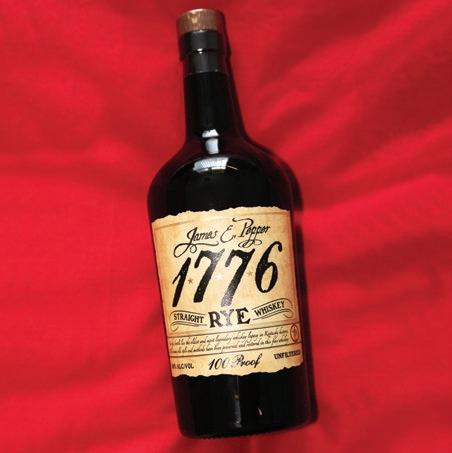


Based in Lexington, Kentucky, the James E. Pepper distillery is a National Historic Landmark that reopened in 2017. The distillery’s sustainability awards are backed by double gold at the 2021 San Francisco World Spirits Competition. jamesepepper.com

Tipples with a difference

From minimising waste to eco-conscious packaging, April Waterston and Stuart Forster look at six tasty alcoholic drinks with sustainable credentials to boot



RESPIRITED VODKA





Haymans Gin produces this vodka using rescued grain spirit from its gin’s distillation and production process. The bottles are made from 100% recycled glass, and one per cent of profits from every bottle of this beverage sold is donated to waste reduction causes in the UK. haymansgin.com



DELIRIUM TREMENS
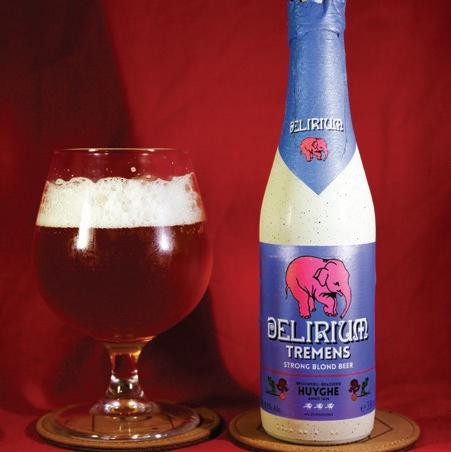






NICE CANNED WINE
BONE IDYLL AGED RUM

Established by a husband and wife team, Bone Idyll is based in Kingston upon Thames in the UK and creates small batch spirits. Empty bottles can be refilled from the still. The Aged Rum has notes of cacao and peach. boneidyll.co.uk

This strong blond beer is produced in the East Flanders region of Belgium. The Huyghe Brewery uses green energy, locally produced malt and has reduced water consumption while brewing outstanding beers. delirium.be
The vision at NICE is to make environmentally conscious wine products for everyone and every occasion. The female-led business is served in Virgin Atlantic’s Economy and Premium Economy cabins. nice-drinks.co.uk

SLING IT OUT STOUT
Seven Bro7hers brew their Sling It Out Stout using upcycled Kellogg’s Coco Pops, as part of the cereal maker’s sustainability programme. They also brew a Throw Away IPA made with leftover Corn Flakes. sevenbro7hers.com
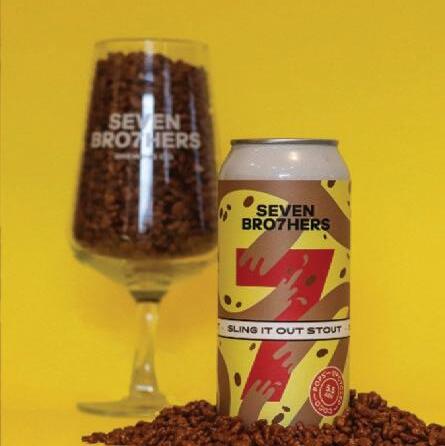
onboardhospitality.com 15 TAKE YOUR PICK /
A labour of passion
The Castello di Monte Vibiano is a historic property topping a hill on a 282-acre estate in Italy's Umbria region. Wine was first produced more than 2,200 years ago on the estate that has been home to the Fasolo Bologna family for six generations. 1998 proved to be a key year in their company’s history. That was when it first partnered with an airline to offer olive oil to First and Business Class passengers. Its single-serve portions are now available aboard more than 20 airlines. It was also the year that the company’s 360 Green Revolution project began; the goal was to eliminate greenhouse gas emissions.
Commitment to sustainability
“Castello Monte Vibiano was committed to sustainability long before it became fashionable or was widespread,” says Claudio Castiglioni, Brand Manager at Castello Monte Vibiano. The multiyear process of moving towards the objective, without carbon offsetting, involved examining all aspects of the


business. Many actions were taken, including installing photovoltaic panels, switching to biodiesel and changing how the land was cared for.
In 2009 the estate became the world’s first agricultural business to receive ISO 14064 certification, recognising its carbon neutrality. A panel above the cellar entrance now displays how much energy the estate produces naturally.
Strategic choices are made to ensure the business remains sustainable. Bottles are chosen because of their weight and associated efficiencies. Packing materials are recyclable and reusable. Goods are shipped by sea to minimise the company’s carbon footprint.















Sustainable viniculture
“Castello Monte Vibiano was the




first winery to collaborate with the Italian Ministry of the Environment to be certified as sustainable,” adds Castiglioni of certification won in 2012. Yet wine is just 20% of the estate’s agricultural output. 80% is olive oil.
Nurturing biodiversity is important and 13 types of indigenous olive trees grow on the estate. Pressings release extra virgin oil and water. The water was long poured onto fields but laboratory research discovered the liquid is a rich source of the antioxidant Hydroxytyrosol. It is used to produce a line of beauty products with that name. “We have a product that is second to none,” says Castiglioni referring to the quality of the olive oil produced on the sustainably managed estate. • montevibiano.it/en
onboardhospitality.com FOCUS ON
Stuart Forster takes a look at Castello Monte Vibiano’s long-term commitment to sustainability…
Strategic choices are made to ensure the business remains sustainable
YOU ARE THE MUESLI TO MY YOGHURT



































Foodcase International is a food Innovation, sourcing, production and supply chain company with sustainability and consciousness at the core of our operations. Active in the transport industry for the greater part of more than 10 years. Her partners are already making large strides into a more sustainable model regarding F&B onboard.






























































A great example of Foodcase’s treats with a conscience is their brand new Yoghurt and Meusli pot. Breakfast options are always difficult for each buy on board program. Airlines are struggling to source a good and healthy solution which avoids food waste as usually breakfast options are mostly fresh or frozen.
“Treats with a conscience”

















Foodcase now introduces the first Ambient Natural yoghurt with Muesli in sustainable cup! Perfect for buy on board programs or as an economy class treat in the morning. The Yoghurt and the Meusli themselves are high in nutritional values and are suitable vegetarians as well. This breakfast in a ¨pot¨ is the perfect solution for airlines who often times need to load fresh items, most of which goes to waste, and for passengers on the fly who opt for a healthier lifestyle.

The packaging aims to used recycled or recyclable materials and the contents of the package are ambient stable for up to 6 months! This solution largely reduces food waste as this can be reloaded on-board until it is sold.



















Untitled-3 1 13/03/2023 15:32 6708WH Wageningen The Netherlands info@foodcase.nl +31 317450604 FOODCASE INTERNATIONAL BV
Untitled-1 1 16/03/2023 09:43
Sustainability in recruitment

















Business Advisor and Executive Search Specialist, Mike Pooley, says that embracing sustainable values will help attract talent and is increasingly important to the future success of businesses…

onboardhospitality.com
18 / RECRUITMENT AND DEVELOPMENT
Sustainability is an expanding topic with many touch points. In this case, let’s consider the workplace. In particular, how the impact and level of awareness that a company’s focus on a sustainability agenda can provide career choices and, in turn, influence and steer them. We recognise essential travel, cementing key business relationships and meeting our commercial objectives as being business critical in the aviation community. We also realise that having pride in performance and a strong sense of achievement is integral to advancing our careers and increasing job satisfaction. However, when we look at filling an open or a new position, or joining a new organisation, are the next generation of graduates or rising stars expecting more from job search and placements in terms of being a right fit culturally and gaining a smooth passage into a working environment more equipped to provide better practices in meeting sustainable and eco-friendly objectives?
To consider this question, I turned to the sector’s working communities. In particular, to two highly informed and articulate spokespersons. Their comments and insights have provided a real substance and transparency as to why a sustainable working environment and agenda is now a major focus for their own roles, the work they carry out, and also a vital enabler in meeting their career aspirations.
CSR and ESG
Sarah Gobind-Cook, Sustainability Executive at SATS, reminds us that corporate social responsibility (CSR) plus Environmental, Social and Governance (ESG) programmes are not new. They have been evolving and gathering pace over the years. Such programmes now provide businesses of all sizes and ambitions with frameworks to aid sustainable decision making, and credentials which address the increasingly concerning state of our planet.
Sarah is typical of new group of strong advocates for a people-based business community. She feels “passionate about

engagement and learning” and highly appreciates that her own role at SATS enables her to “play in a stream of sustainable activity.”
Although challenging in scope, and certainly there is no ‘one-size-fits-all’ solution, Sarah recognises that engaging across a company like SATS and providing more awareness and education can ensure that the aspiring managers of today become the alert leaders of tomorrow. That requires a highly motivated, accountable mindset committed to a strategy and mission of developing longer term sustainable resolutions.
B Corp












As far back as 2004, the UN called on all types of business to embrace an ESG culture in its Who Cares Wins initiative. The establishment of B Corp certification was one key result. Sarah adds that over 1,500 UK businesses, including Monty’s Bakehouse, now pursue or have achieved their accreditations. No matter whether it is seen as ‘too much hard work’ or ‘reputationally essential’ when it is cascaded down in an organisation, employees and managers involved in implementation are far better educated as a result and can become deeply invested in retaining a B Corp status.

So why sign up for a role in a sustainably focused business? One reason is you are going to find yourself amongst likeminded people. As a result, that means more collaborating, and adding tangible value through your actions.

Continuing this timely discussion is Saskya Liney, Sustainability Champion at From Now, a newly formed venture involved in identifying, facilitating and communicating the type of change needed to create a sustainable future for hospitality, leisure and events. Saskya is at the cutting edge of moving her own parent company – emc3, the established global events business – to the forefront of promoting a new set of ecopriorities for companies and business travellers. It is a customer base which recognises that mass events and collaborative working spaces must be increasingly environmentally conscious and viable to be sustainable.
Both Saskya and Sarah reference the triple
onboardhospitality.com




RECRUITMENT AND DEVELOPMENT / 19
The aspiring managers of today become the alert leaders of tomorrow
bottom line (TBL) objectives of economic, social and environmental credibility within a company’s mission. “Job applicants are more and more interested in a company’s values and culture, and seek to find positions at more environmentally conscious organisations in order to align their career path with their personal values,” says Saskya.

The key for employees is to connect and appeal to new starters by being honest and transparent. That connection starts by both parties sensing that each other is a good fit. “I strive to work with brands that I 100% trust and can be proud to support,” adds Saskya.
CSR, ESG and B Corp are frameworks now embraced by many companies to encourage and promote better practice. But the pace of the accreditation processes and the capacity to represent, uphold and secure these values over time will be determined by a top-down approach from leadership and implementation by a team of dedicated people who will ensure long-term sustainable development.

Recruiting and developing this cluster of talented and committed individuals seems a key element in staying ahead and having the capability to meet the levels of tight scrutiny and clear integrity now demanded as evidence of good business practice and performance.



Tips for driving the agenda

• Define a clear social purpose for your business through strategy, leadership and culture. Make the topic accessible and meaningful to all and share it.
• Review and continue to revisit your workplace best practices. Do they align with your sustainable goals? Are they fully
Make sustainability a key part of recruiting and onboarding programmes

transparent and understood?
• Make sustainability a key part of the recruiting and onboarding programmes. Increasingly, many talented next generation individuals will not be interested in joining your team if the values and aspirations they personally uphold are not evident in the description of the open position or the culture of the business, as advised through its value statements.
• Provide training and advise. Specialism is always required but be inclusive and broad across the organisation in positively exposing employees to the values of working in more eco-smart ways.
• Identify easy, tangible wins. Not all businesses strive for formal accreditations like B Corp but how your unit upholds sustainable values is a positive step forward – look towards big businesses such as M&S, Nestle, Unilever and IBM for inspiration.
• Incentivise employees. Add recognition and achievements in this area to the key performance indicators (KPIs) and annual objectives and always promote employee ideation. There is a lot of wins for human resources and CSR professionals to add to their agenda in this context.
• Nurture ownership. Everyone can engage and help out. Elect and promote sustainability champions and ambassadors. Stage events and set up campaigns in the office and the community beyond. This will often attract new joiners because the culture will be appealing.
• Provide voluntary support. B Corp requires work in the community and education space. Getting out to experience making changes for good builds commitment as well as both pride and resourcefulness. •















onboardhospitality.com
20 / RECRUITMENT AND DEVELOPMENT
The fabrics of society










Stuart Forster talks with industry experts to examine trends in the use of sustainable fabrics…






When it comes to fabrics used onboard, innovation is ongoing to improve sustainable credentials.





“With advanced technology, recycled products today have some amazing finishings which can easily replace the comfort of virgin fabrics,” says Manoj Pridhanani, Chief Design Officer and Head of Sustainability at Kaelis. “Our Metamorphosis Blanket, for example, is made up of 26 plastic bottles, a transformation we could not have imagined a decade ago.”
Whatever the fabric, it is paramount that products used onboard fulfil the trinity of being functional, comfortable and sustainable. While aircraft and fuel choices play a major role in
reducing airlines’ carbon footprints, onboard products add up and contribute.

Kenny Harmel, Watermark’s Managing Partner, goes as far as saying: “Every customer that we are speaking to is prioritising sustainability across all product lines in all cabins. It's a key priority for both airlines and suppliers, and we're constantly working together on new ways to meet the demand for more eco-friendly products.”
“We are seeing far more natural fabric, such as cottons, bamboo and Lyocell, as well as 100% recycled material such as rPET and nylons,” he observes, explaining that it is important to look at everything from a material’s provenance to what happens at the end of its life to understand the true environmental impact of a fabric and
onboardhospitality.com
SUSTAINABLE FABRICS / 21 ISTOCKPHOTO.COM/FASCINADORA
determine how to improve it. Efforts to satisfy sustainability concerns while delivering products that meet budgets are underpinning innovation. He argues that, ultimately, an item made from virgin material that is reused for many years can be regarded as more sustainable than a product made from recycled material that is used just once.
The importance of looking beyond simply the material used in the fabric is accentuated by Alison Wells, a Co-Founder of Plane Talking Products: “You've got to look at the whole thing around how it's processed, how it's harvested, where it's coming from and how quickly is it growing. If it's waste fibres – so waste that would possibly previously have been burned or thrown away under normal circumstances – then I think it's a good thing if you can somehow flex that and use it.”
Plane Talking Products has a range of bamboobased textiles, including blankets, duvets and sheets. And rPET is proving flexible. “There is a huge range of finishes and design applications available with rPET and we have been working hard to pull together different design options that could work in all classes of travel,” explains Wells.



Topical tastes



















It seems nowadays that the sky's the limit when it comes to which natural materials can be repurposed into fabric. Fabrics created from coconut husks and algae are being used. Leather derived from mushrooms, apple, banana and even cactuses have entered production. They take organic waste and repurpose it into elegant fabric.













Inevitably, the fabric used to create onboard products varies by cabin. Sarah Klatt-Walsh, Sustainability Lead at FORMIA, explains that fruitbased fabrics such as apple leather and Piñatex, a synthetic leather featuring fibres from pineapple leaves, and has seen an upsurge in use to make First Class amenity kits: “These niche materials tend to be feasible here due to the smaller volumes and higher budgets involved.”
Klatt-Walsh suggests that the social links with communities involved in the production process count among the most interesting recent developments in fabrics. That encompasses the people who collect plastics from beaches that are used as raw material and artisans who produce fabrics.









“The recent Delta amenity kits with Mexicobased B Corp Someone Somewhere, a partnership facilitated by FORMIA, is one example of the latter. Generating jobs for over 250 people across Mexico’s most vulnerable states, the collaboration provides social and economic support for underprivileged communities, and even enabled a direct connection between the passenger and the artisan who created their kit via a QR code on the bag,” she explains.
FORMIA’s Sustainability Lead says that there is lots to watch out for in the near future, including high-technology, synthetic fabrics and 3-D printed fabrics.












22 / SUSTAINABLE FABRICS
Photos: Products used aboard aircraft are derived from both recycled and natural materials, including leather made in Scotland.
Sustainable technologies
















“Sustainable technologies are being developed and airlines should be considering products such as SkyLeather for their interior solutions,” urges Sohaib Ahmed, Programme Manager – Interiors at AJW Interiors, the product’s sole distributor. “It is free from harmful chemicals and does not contain any polyvinyl chloride (PVC) or phthalates, making it a safer and healthier choice for both passengers and the environment.”
Made from water-based polyurethane, SkyLeather is a durable and flexible material that can be used to create a range of products. “This innovative alternative to natural leather is 25% lighter than hide leather, which can significantly reduce aircraft weight and hence reduce aircraft fuel consumption and the environmental impact of the airline using it,” adds Ahmed.




Natural choices
Archie Browning, Sales Director at Muirhead, points out that his company has developed a lightweight leather called LightCore, which is already used to create aircraft seating. It is onethird lighter than standard leather but the same thickness.




















“Cattle are raised for the food industry, for beef, so you've got a choice. The hide either goes to landfill, which is a terrible solution, or we turn it into a product that can carry passengers 16 hours a day for seven years and be used as a seating material. All the animals are grass-fed which helps

keep down the impact on the environment,” says Browning.
The team at rohi has noted a fusion of residential and aviation aesthetics, with a comfortable, homely feel in aircraft cabins becoming important. “Natural upholstery fabrics, such as finest virgin wool, are giving passengers a great sense of wellbeing,” says Kathrin Ott, Senior Designer – Aircraft Textiles.


Meanwhile, Wolfgang Bücherl, Managing Director of skysupply, intimates that selecting even a sustainable natural fabric such as cotton means weighing up the pros and cons relating to the environmental impact. “You need a lot of water to get the cotton,” he says of the production process.

Circularity is key











Alex Allen, Design Manager at John Horsfall, notes that eco-friendly initiatives and recycled materials have evolved from being an additional choice to, instead, becoming an essential consideration. It’s also important to utilise textile waste initiatives, improve textile circularity and embrace the use of plant-based inks for dyes and printing.



“One area where we have definitely seen change is the move away from fabrics with high fibre-shedding issues; stemming from a growing concern of micro-fibres polluting the water systems. A move towards traditional woven items with tightly spun yarn can help the environment by dramatically reducing the micro-fibres being released from the product, in comparison to an alternative item such as fleece,” says Allen.
“While textiles and aviation will always be environmentally impactful, we work within our own business and with our airline clients to help them make the most sustainable choices they can. Encouraging our customers to choose well-made, considerately sourced, long-lasting products which can be safely reused time and time again; therefore, reducing the amount of textiles heading to landfill,” she adds, explaining that a well-made woven blanket, which can be hygienically cleaned and looks good when re-used, is an environmentally sustainable choice over a low-quality, short-life alternative.
Choices remain abundant but in modern business, it’s evident that responsible, long-term thinking has to be a factor in decision-making. •


SUSTAINABLE FABRICS / 23
100% recycled material
Reinventing Watermark
AN INTERVIEW WITH KENNY HARMEL
Watermark’s Managing Partner discusses the company formerly known as Galileo-Watermark with April Waterston and Stuart Forster
Q. Please tell us about your company.
A : Watermark is one of the oldest aviation product suppliers in the world. We have been around since 1980 and currently do work or have worked, in some capacity, with every airline in the world.
We’re one of the very few suppliers that can design, source and manufacture pretty much any product that a passenger can interact with. So if you were to take an aircraft and turn it upside down, we’re able to design and supply anything that falls out –textile products, meal service items like porcelain, glassware, stainless steel, and, of course, amenity kits. That is what Watermark has been associated with, and famous for, for over 40 years.
Watermark is associated with many iconic products on board, including the Anya Hindmarch amenity kit which is still recognised as one of the most cherished and celebrated amenity kits of all time.
Ian [Linaker] and I started Galileo Products in 2012, which was a smaller company doing very similar things but around creating curated experiences for passengers and trying to drive the industry forward in terms of sustainability...the opportunity arose in 2016 to acquire Watermark and
became Galileo-Watermark. We decided during COVID to revert back to Watermark and rebrand.
Q. How important is sustainability?
A : We see being sustainable as an obligation rather than a choice. Wherever possible, airlines are seeking to make the change to more sustainable materials. It is, ultimately however, still driven by cost, which is why we’re constantly working on innovations to balance budgetary and environmental requirements.
to determine how to improve it. An item made from virgin material that is reused for many years is more sustainable than a product made from recycled material used just once.
Q. Was it hard to get rid of Galileo?
A : What was more important is what we created and what we became synonymous with over that time. Watermark has such a long-standing heritage, and is renowned for so many different things in the industry. The brand was grounded in simplicity, innovation, technology and really rooted in sustainability. Sustainability touches everything, not just material, but financial sustainability. That was the foundation for the brand.
Q. What have you been doing since 2020?
We’ve long been associated with sustainable industry firsts. Watermark launched the first RPET products onboard an airline; the first bamboo product; we launched the lightest and purest glassware in the world; we launched cosmetic packaging made from ocean-recycled plastics. We really do try and drive innovation.
















It’s important to look at a material’s provenance through to its end of life to understand it’s true impact and
A : Over the last couple of years we’ve been working very closely with clients. COVID gave us an opportunity to take a step back and think about how the industry is going to change over the next five to 10 years? That was really interesting for us and where we could learn quite a bit.
We’ve been doing a huge amount of work behind the scenes on how we as a company can be more sustainable. To be ultimately sustainable requires
24 / IN CONVERSATION
onboardhospitality.com
We see being sustainable as an obligation rather than a choice
a completely different approach and thought process. To introduce something that the industry isn’t thinking of or isn’t orthodox – that’s the exciting stuff.


It goes beyond just material choice –where they are sourced, how they are created and farmed. It means looking at how the product is packed, shipped and, ultimately, the end of its life.















You’ve got to completely rethink sustainability from the ground up, from start to finish, and make sure that every person within the organisation is looking at what they do and how they do it with sustainability in mind.

What sets Watermark apart? We will never enter into a new project or opportunity with designs in mind. We always listen to the requirements of our partners and what they’re looking for.






























We like to bring newness and cherrypick a handful of curated ideas, that we feel align closely with the airline that we’re working with. We’re always trying to infuse innovation and the trends that we’re seeing.


It’s our detailed approach and our consideration for each opportunity that separates us.





















Q. What do you want to achieve through rebranding?


A : The main goals for the rebrand are to remind people of what Watermark is famous for. We want to be seen as a problem-solving partner.
We want to move away from being a design and product partner and supplier, and instead become an extension of the airline.
The industry has certainly come forward a long way. Different challenges present themselves and old ideas no longer fit. We’ve got to evolve with how the industry and airlines are evolving. We need to adopt thoughts offering solutions to those challenges. •

IN CONVERSATION / 25
onboardhospitality.com
The SUSTAIN ability challenge
The airline industry is showing signs of recovery and surprising resurgence. This is unfolding against a new sort of customer behaviour. Issues like health, wellness and sustainability are top of mind in customer expectations and guiding travel decisions.
The world is adapting to hybrid working models and people are spending their leisure time differently. The travel industry is undergoing evolution. This is why we must adapt to new norms and remain relevant to customers.
Two-thirds of customers say they are willing to spend more to ensure trips are eco-friendly or minimise negative environmental impact. Consequently, airlines are addressing ecofriendly customers.
Airlines are looking to engage audiences practising sustainable behaviours at home and
while travelling. These behaviours matter for the environment and customers’ social and economic decisions. This is why more and more companies are increasingly building a sustainable business –to please customers while protecting the planet.
It's over to companies to find what is acceptable to customers and to find creative ways of compensating their footprints. That could be by paying by miles or exchanging their baggage allowance or meal to offset carbon emissions. Industry collaboration is needed in order to accelerate the development of offsetting.
Decarbonising aviation
Holistically, airlines need to try to achieve net zero. The aviation industry accounts for approximately 2% of the world's emissions. The increasingly negative effects of climate change, highlighted by COP15 and COP27, have made
26 / XXXXX onboardhospitality.com BETTER PROCESSES AND PRACTICES
Founder of IN Air Travel Experience, Anne de Hauw, discusses some of the issues that airlines must address while becoming sustainable…
decarbonisation a top priority for many airlines. Demand reduction may be part of the answer. Some customers consider reducing their number of trips and are ramping up pressure on the sector to reduce carbon emissions. In response, IATA member airlines have committed to achieving net zero carbon emissions by 2050. This pledge brings air transport in line with the objectives of the Paris Agreement to limit global warming.
Achieving that will rely on the combined effects of multiple emission reduction measures, including the accelerated adoption of innovative aircraft technologies, streamlined flight operations and increased production and adoption of Sustainable Aviation Fuel (SAF) in the short to medium term.
SAF represents the greatest opportunity to decarbonise as it is already commercially available. It can be easily blended with conventional kerosene without technical adaptations to aircraft engines. Demand is there but, because of the high costs compared to fossil-based fuel, scaling up production is needed.
The adoption of SAF will require cross-industry and government action. Laws must be changed.
Waste to fuel
Meat-derived components of international catering waste (ICW) generated on flights are subject to regulation in places such as Australia, Canada, the European Union, New Zealand and US. Some jurisdictions, including the US, extend the ICW definition to include fruit and vegetables. ICW often includes contaminated food waste, so is incinerated, autoclaved or goes into deep landfill.
Recently, along with other experts, I've been exploring if we can divert food waste or waste coming from airlines as a feedstock for SAF. SAF is usually made from waste and residue fats, oils and greases produced by hydroprocessing esters and fatty acids (HEFA). If you make its production circular, aeroplanes fly more sustainably.
Scaling up production is limited by the availability of sustainable biomass feedstock. Waste coming off aircraft needs to be segregated
and governments need to review and ease regulations, so that waste can be used to produce SAF.
Companies such as Neste and Epic Fuels are working with Airbus and Boeing, respectively, and some airlines. Governments are also investing in those kinds of sustainable fuels.
Hydrogen or battery-powered electric aircraft will start entering the market by 2030. In the shorter term, carbon offsets are required as a bridge to fund the early stages of decarbonisation.
Carbon Offsetting and Reduction Scheme for International Aviation (CORSIA) requires airlines to offset any growth and CO2 emissions from international routes above 2019 levels. The scope is to stabilise emissions while other reduction measures are pursued. These include the development of new technologies, sustainable operations and SAF.
Purpose…plus profit
The key challenge is always to balance profit and purpose, costs and budgets and investments required without a bottom-line return other than the planet. It is crucial to find ways for airlines to reconcile sustainability and profitability and to debunk the myths that leaders have to choose between profits and purpose.
Many businesses have already infused sustainability across their strategies. They are growing their bottom line and increasing long-term viability. This is step number one. Some leaders are actively making sustainability part of their DNA and driving cultural change. Those companies have long-term benefits, both from a profit as well as a
XXXXX / 27 onboardhospitality.com
PRACTICES
BETTER PROCESSES AND
It is crucial to find ways for airlines to reconcile sustainability and profitability
purpose perspective. Companies waiting for legislation before they take action will have a lot of catching up to do. It will be tough to convince customers that they have embedded purpose in their operation are not just profit-driven.
The impact of reducing the number of meals loaded onboard or removing a magazine that weighs 200 to 250 grams, multiplied by the number of passengers, does have an impact on the weight of aircraft and flight. You can explain to customers why they have a digital menu and a digital magazine. You can explain it because you can demonstrate the carbon emissions you're offsetting. Storytelling by removing magazines and reducing the number of meals loaded, or having lighter seats is geared towards the customer.
Incremental change
Every baby step adds up. We should not minimise the impact of small initiatives. Engaging with customers before flights would help reduce what is loaded. Customers can make a difference by pre-ordering meals, minimising luggage and reusing amenities. We should embrace initiatives where – as a community – customers, flight attendants and airlines work together for a more sustainable future. Suppliers use compostable, recyclable or recycled materials. They are introducing
circularity. They are great initiatives but shouldn't we start with scrutiny of what is flying today and examine whether everything on board is really needed?
By the time an aircraft takes off, many stakeholders have been involved in making a commercial flight viable. That includes suppliers, grounds handlers, caterers and flight attendants. It requires collaboration to minimise operational impacts and achieve results.
Back to the customer
Customer needs must be put in a central position and catered to. That means being listened to and curated. In the future, customers will be in the driver's seat in the sense they will only want to work with companies or book flight tickets with airlines that share their goals and commitments. Consequently, airlines need to build deeper connections with their customers, and also with the planet in order to curate relevant experiences. It's going to require vision and connections to reach the destination. There will be a price and it will require commitment to sustainability. That relates not just to the planet but also the sustainability of social and operational commitments.
Wanderlust will win over flight shaming. And as an industry we need to see this time of change as an opportunity to build deep connections with both our customers and our planet. in-atx.com •
28 / XXXXX onboardhospitality.com
BETTER PROCESSES AND PRACTICES



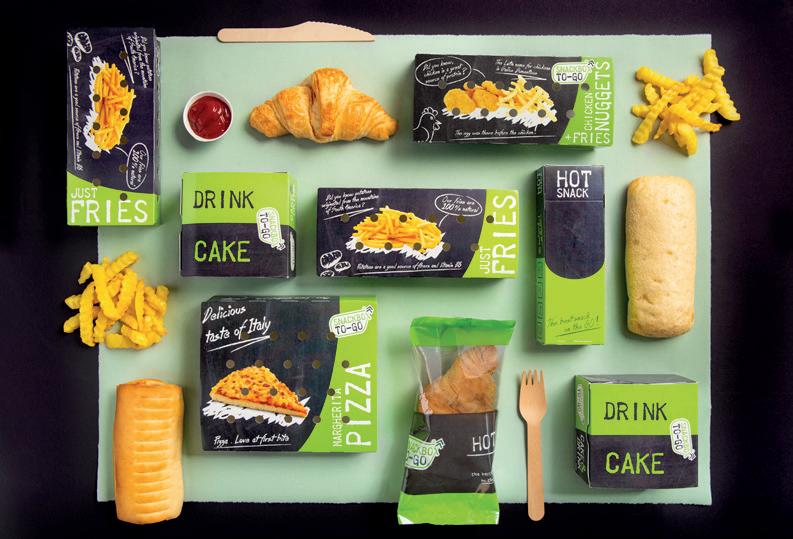












Premium onboard single pack snack solutions www.snackboxtogo.com | sales@snackboxtogo.com Untitled-1 1 07/03/2023 13:41 Untitled-3 1 01/03/2023 10:54
TydenBrooks
TydenBrooks is celebrating its 150th anniversary during 2023. E.J. Brooks was originally known as a lead toy manufacturer in New York City and soon became America’s first security seal manufacturer.
TydenBrooks remains a first-class global innovator of security seals, which owns and controls five strategic manufacturing sites around the globe. “A lot of the security seals that are being used across industries around the world today, will have evolved from an original TydenBrooks part or patent,” says Paul Perry, Head of Marketing, Internal Sales – EMEA.









Relating to inflight catering operations, TydenBrooks designs and produces a range of security seals, specifically for



















catering and duty-free carts. “We have worked closely with our customers and identified the day-to-day problems relating to theft and shrinkages. Each product forms a complete, tailored solution for the airline,” explains Paul.




The company’s tamper-evident Hawk Seal consists of a reusable padlock with a metal hasp, that is resistant to corrosion from the washing cycles of the carts. The HawkLock reusable padlock houses the disposable HawkSeal, which can be made in various colours for each part of the inflight catering operation. Each seal is laser marked with the airline’s branding and sequential number. The Hawkseal has several mechanisms to help the product stay strong during cart movements to and from the aircraft
to the airport bonds. Once sealed the HawkSeal can only be opened when cabin crew break off to open the cart. On the sustainability side, the material that is used to produce the HawkSeal is the part that we’re collecting.
There are security seals companies that say they’ve produced biodegradable security seals, using a bio pellet in the injection mould process to form the seal. These competitors have told customers you can throw the seals on the floor or dump them into landfill and the seals will degrade. We could have taken this approach as well, but these statements are not true. Biodegradable materials can be only sent to a special certified landfill site designed for degrading compostable plastic materials. Even here the
onboardhospitality.com
ADVERTORIAL ISTOCKPHOTO.COM/PIXTUM
Paul Perry discusses the sustainable initiative launched by TydenBrooks, a company whose origins were in 1873
degradation can take over 140 years, and some competitors’ seals have metal inserts in them so the seal can’t be biodegradable.


After 225 days of conducting testing of our own security seals, our R&D department concluded a biodegradable security seal was not the appropriate solution. It was not efficient enough. The biosphere pellets couldn’t penetrate and break down the seals. Even with 30% added into the injection mould process, rather than the recommended 1%, it still didn’t work. We had a duty of care to our customers and decided on an alternative solution.
Working with the British government, Environment Agency, DEFRA and the BSI, we developed a model and an alternative process that would deal with green-washing and plastic seal waste. This simple circular process, called TydenGreen, is a fully recyclable, reusable solution. The scheme offers economic benefits to companies who are required to pay the plastic tax tariffs, which came into force on April 1 2022.
Currently, we are in partnership with easyJet to roll the TydenGreen scheme out across UK airports. We’ve created a reusable sack with inspection windows, to prevent cross-contamination. All



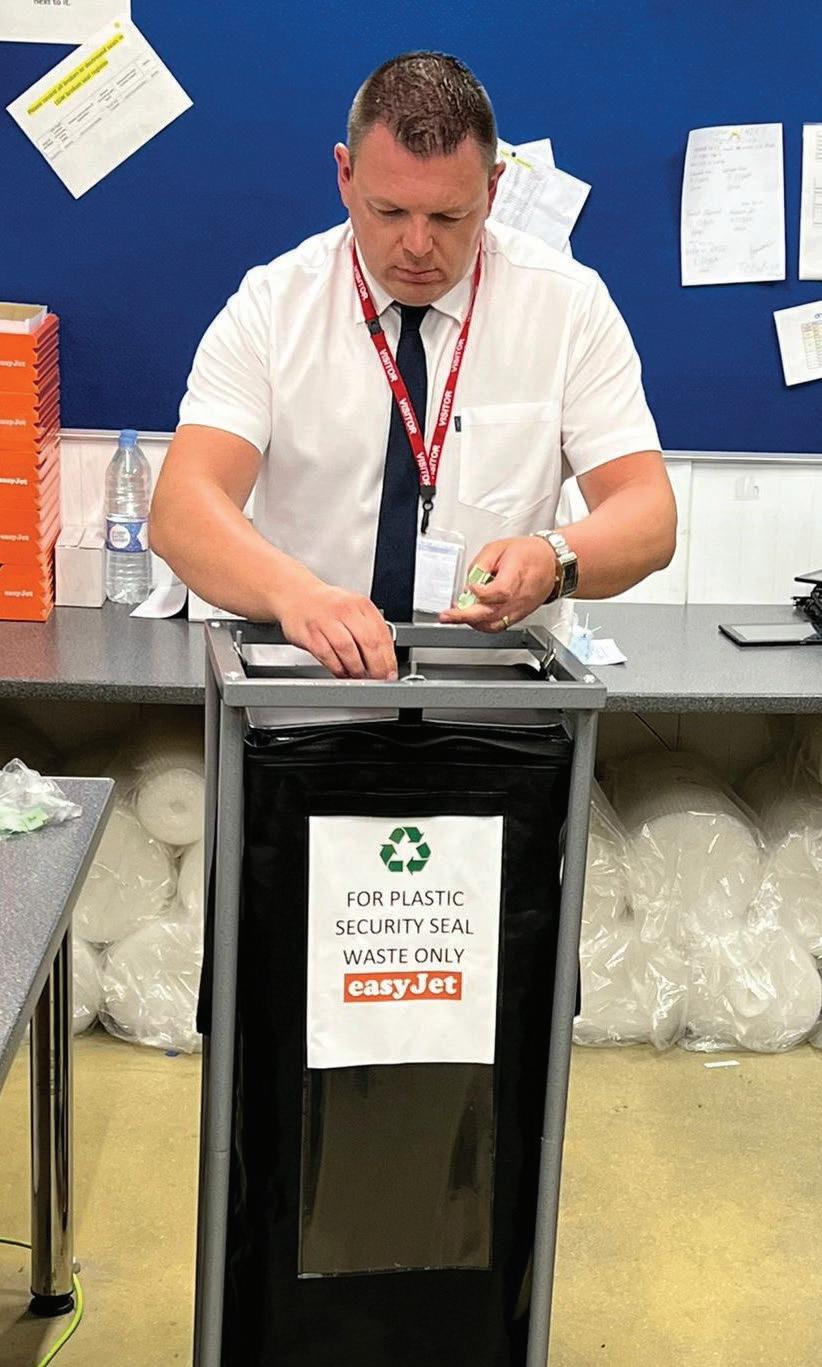
the used/broken seals are brought back and placed in the sacks at the warehouse bonds. The full sack is dropped into an octabin made of recycled cardboard. When full, it’s collected by our recycling partner.
The contents are weighed, put through a grinder turned into smaller pellets which are sold on to make things like garden furniture, school chairs, school tables, traffic cones, even washbowl basins. The goal of TydenGreen is to prevent them from being dropped into general landfill. This is what we believe to be the true way in operating a sustainable security solution for our customers.
Since the start of the pilot scheme involving easyJet and Dnata at Gatwick Airport, over a million used Hawk Seals were collected, weighing 3.2 tonnes –the equivalent of a large pickup truck.
“The goal of TydenGreen is to prevent used seals from being dumped into general landfill. That is what we believe to be the true way of operating sustainably for our customers… We’ve been challenged by some of the biggest airlines in the world to support them in reaching their net zero targets. Our way of doing that is by making sure that every airline has been introduced to the TydenGreen scheme. Wherever they are in the world, we’ve got a model or a framework to follow,” says Paul of the initiative.
“We want to make sure that people are taking sustainability more seriously and make sure that we’re doing our part to raise awareness and take action,” says Paul about TydenBrooks. TydenBrooks will be exhibiting TydenGreen at WTCE along with our complete inflight catering security solutions.
tydenbrooks.co.uk •

onboardhospitality.com
ADVERTORIAL
This simple, circular process...TydenGreen is a fully recyclable, reusable solution
Cruising towards
in February, Monterey City Council, in California, voted to cease offering incoming cruise ships passenger landing services.
It was argued that environmental risks to Monterey Bay outweighed financial benefits brought by cruise tourists. Indicating that cruise ships are not desired, Monterey's vote follows in the wake of debates elsewhere about the environmental impact of cruise ships and cruiserelated mass tourism in destinations such as Venice, Italy, and Barcelona, Spain.
The Cruise Lines International Association (CLIA) has already developed voluntary standards for environmental responsibility, covering matters such as greywater discharge, which exceed those outlined by the International Convention for the Prevention of Pollution from Ships (MARPOL).

environmental awareness
And broader change is afoot in the cruise industry according to Andy Harmer, CLIA’s UK

and Ireland Managing Director: "Cruise lines are increasingly including environmental education in their communications, marketing and onboard offerings – and that is increasing awareness of the importance of environmental protection and advancing a green agenda. 84% of people who have cruised in the past 12 months are more aware of the importance of the environment than they were before they cruised."
In turn, shifting sensibilities among customers mean that cruise operators look set to benefit from adopting more sustainable practices.
"50% of cruisers and those open to cruise say they are more committed to making travel decisions based on environmental impacts than they were three years ago,” says Harmer.
commitment to responsibility
Swan Hellenic has made a commitment to responsible cruising with the company’s sustainability policies reaching beyond a purely
Stuart Forster looks at the adoption of sustainable practices and policies by cruise lines…
32 sustainable cruising onboardhospitality.com
environmental focus to six areas embracing the broader United Nations Sustainable Development Goals. They include equality, diversity and inclusion policies that promote equal opportunities for employment and professional development, “irrespective of gender, ethnicity, culture, religion, age, sexual orientation, functional ability and political view.”
Relating to provisioning, Swan Hellenic states that the fish and seafood served aboard its vessels meets World Wildlife Foundation-approved sustainability criteria. And a selection of beers, wines, spirits and speciality foods are sourced locally to support local economies and reduce the carbon footprint of sourcing food and drink.
Founded in 1954 – 62 years before the city council in Darebin, Australia, became the first governing authority in the world to declare a climate emergency – Swan Hellenic operates expedition cruises. SH Minerva was launched in 2021 and followed by SH Vega in 2022. A third state-of-the-
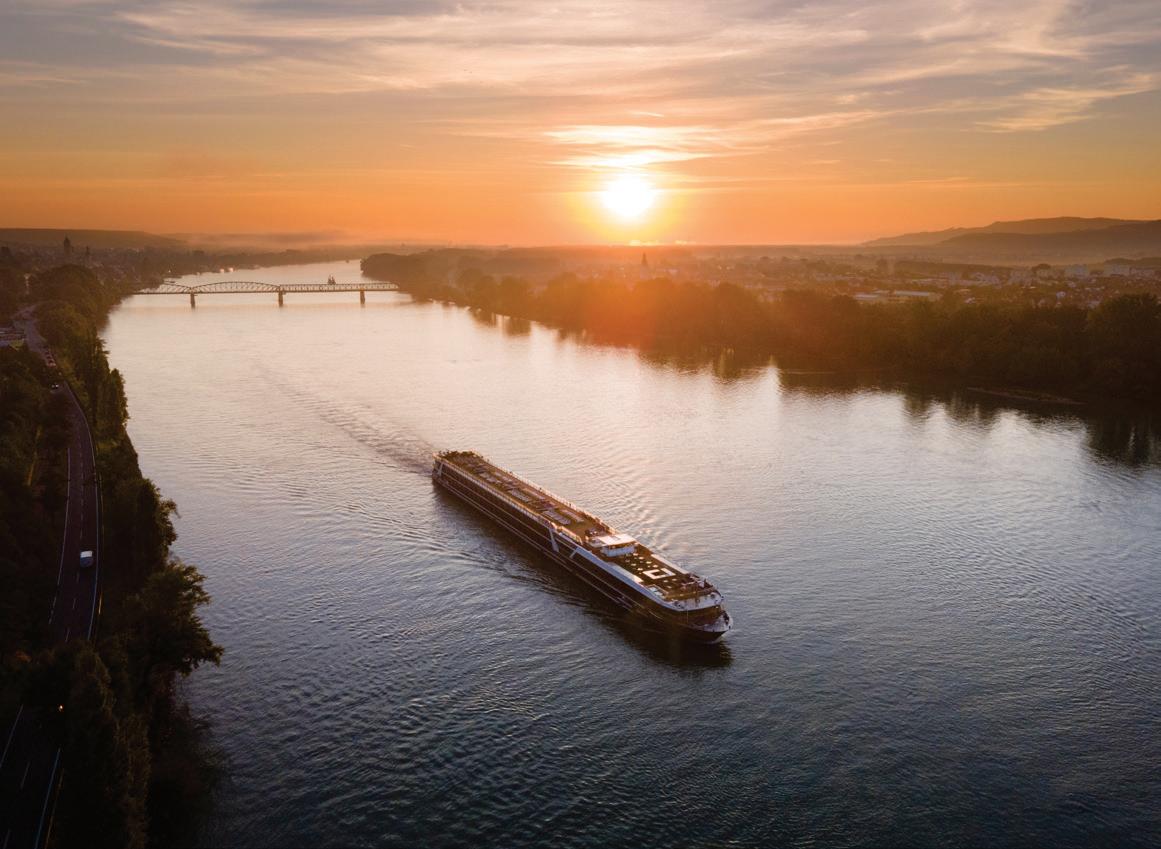
art expedition ship, SH Diana, is scheduled to join the fleet in the middle of this year.
Plastic policy
Inside their staterooms, passengers will find toiletries and soaps that are free from ingredients such as cocamide, parabens and silicone. They are dispensed from recycled plastic units in line with the strategy, now widespread within the cruise industry, of minimising single-use plastics. That extends to using refillable water bottles in staterooms and carafes in restaurants, minimising packaging and using paper rather than plastic straws.
The cruise line operates a paperless policy but prints on forest-certified or recycled paper when necessary. The Swan Hellenic phone app and supply of information via smart televisions in staterooms support that policy.


Interiors are decorated prioritising materials that are sustainably certified and natural or recycled


onboardhospitality.com

 Clockwise: European river cruising is growing in popularity; An elegant ship interior; Stateroom aboard a Sea Cloud vessel
Clockwise: European river cruising is growing in popularity; An elegant ship interior; Stateroom aboard a Sea Cloud vessel
sustainable cruising 33
beers, wines, spirits and speciality foods are sourced locally to support local economies
and recyclable. Textiles and surface coverings, meanwhile, are low-solvent. They are cleaned with biodegradable products made from materials of natural origin.

And when it comes to uniform fabrics for Swan Hellenic crew members, the use of fleece fabrics is avoided as they shed high volumes of microplastics while being washed.
Wind-powered sailing

Cruising is often associated with ‘floating hotels’ capable of housing thousands of guests but is a diverse industry offering a broad variety of experiences and ship sizes. Sea Cloud Cruises operates sailing ships that, whenever possible, unfurl their sails to make use of the renewable energy source long associated with powering seafaring. “The principles of gentle tourism and sustainable trade have been inscribed on the DNA of Sea Cloud Cruises ever since its inception over 40 years ago,” says Anja Ringel, the company’s Director, International Sales & Marketing.
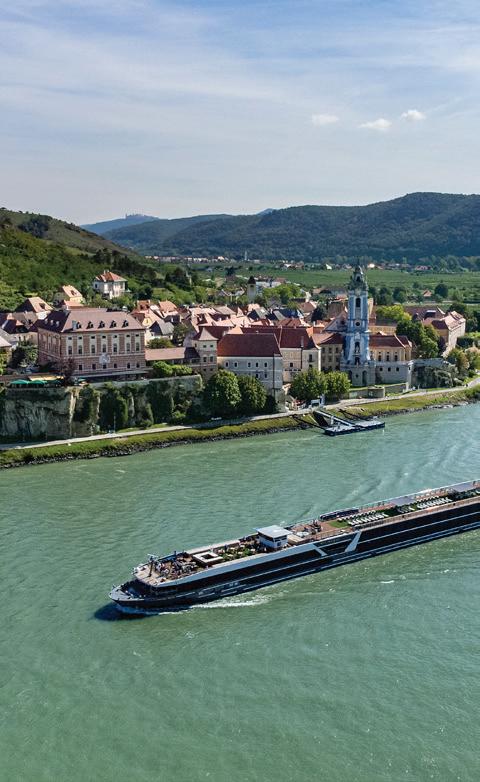
Its 32-cabin flagship, the windjammer Sea Cloud, was launched in 1931. According to Ringel, it is a manifestation of Sea Cloud Cruises' commitment to sustainability. That is reflected in onboard details such as reusable glass drinking straws at the onboard bar and menus featuring ingredients purchased by chefs at local markets.

special relationship
“Shipping companies and crews maintain a special relationship with the regions that our ships visit. It’s taken as read that everyone treats the people there, their culture and nature with respect. Wherever possible too, the shipping company cooperates with local partners so that the value chain of each trip includes the people ashore and does not simply stop at the railing,” adds Ringel.
That and the relatively small size of Sea Cloud Cruises’ vessels means the ships are “always
onboardhospitality.com
welcome” in ports such as Barcelona, Dubrovnik and Venice.
APT is a luxury river, small ship and expedition cruise specialist. Its sister brand, Travelmarvel, offers a flexible four-star and value alternative, including river cruises on the Nile and Ganges. “The way that river cruise lines manage their procurement can have a big part to play in the creation of a socially responsible travel model. River ships are smaller than their ocean-faring cousins, meaning that they have reduced space for storing consumable goods on board. As we dock in different towns and cities along the rivers for our guests to explore, our chefs are also stepping ashore to source local produce from suppliers and markets throughout the cruise,” says Brad Bennetts, APT and Travelmarvel’s Head of Sales and Business Development.

He explains: “This has myriad benefits. Not only do our guests get to enjoy the very freshest ingredients and sample truly local specialities from the regions they sail through, but the company’s F&B investment directly benefits the communities that we visit, allowing us to support independent producers and protect their artisanal techniques and cultural heritage.”
“We do all we can to create responsible travellers. One way in which we achieve this is by encouraging our guests to explore beyond the tourist traps, spending their currency in a way that will directly benefit the local economy,” he adds, pointing out that the structure of cruises reinforces that. They are not all-inclusive and dock overnight on Adriatic islands during Croatian yachting itineraries which enable guests to visit local restaurants and bars.
“While enjoying these magical moments, our guests are directly supporting the economies of these beautiful places, contributing towards their longevity. It’s a win for everyone,” says Bennetts. Could widespread application of such thinking help Monterey City Council reassess its decision? •
34 sustainable cruising
Above from left: Dutch windmills seen while cruising; A Travelmarvel stateroom; sun loungers for Sea Cloud guests; Cruising on a European river
Ethical cruising
Stuart


Ethical and sustainable cruising are pillars of the Ambassador brand. The company’s first ship, Ambience, is in the top 10-15% of environmentally sustainable ships. Her sister ship, Ambition, will come into service in May 2023.

Ambassador’s no-fly cruises sail worldwide from the UK. Bob’s job is to ensure guests have a memorable time. “I look after the product offering onboard to ensure we meet and exceed our guests’ expectations whilst providing an authentic, premium-value cruising experience. I also manage turnarounds around the world, making sure that our ships are ready to welcome their next guests,” says the Head of Guest Experience.
Protecting the oceans
“We believe that we have a responsibility to protect both our oceans and the destinations we visit. So, we are on a mission to be among the most sustainable cruise lines in the business,” he explains.
Ambience exceeds the latest environmental standards, including no single-use plastic on board and energy-efficient engines. Since her first sailing in April 2022, Ambience’s emissions have been reduced by 95% by installing selective catalytic reduction units,
reduction units,





















which convert harmful gases into inert nitrogen and water vapour.



Conscious change


“Onboard, we have advanced sewage installations and all our food pulpers have been replaced by biodigesters to break down food waste into water and heat. We have installed bottle washers onboard and our own still and sparkling water bottling plant, ensuring guests feel both responsible and hydrated. All the materials used in our arts and crafts classes are created with sustainable materials,” says Bob, before revealing that sustainable resources are also used to create costumes and sets for entertaining guests.
“We are also proud to work with









charities and partners that support our ethical and sustainable values, so that we can give back to the community and continue our journey towards a more sustainable and ethical industry. Our partners include ORCA – the charity dedicated to studying and protecting whales, dolphins and porpoises – with whom we launched the first-ever cruise Anti-Whaling campaign,” he adds. Crew uniforms are created using sustainable materials. Ambassador is in the process of producing a bespoke range that will be launched in May on its new ship, Ambition. Practical and comfortable for the crew, they will, of course, incorporate the company’s colours. ambassadorcruiseline.com •

FOCUS ON / 35 onboardhospitality.com
Forster talks with Ambassador Cruise Line’s Bob McGowan about sustainability aboard the UK-based line, whose first sailing was in April 2022
We have a responsibility to protect both our oceans and the destinations we visit
War on waste
As pressure mounts for changes to International Catering Waste (ICW) regulations, Julie Baxter explores the barriers to cutting cabin waste now…


In the latest industry-wide cabin waste initiative, 25 aviation signatories called for an urgent review of ICW regulations – now seen as the biggest block to truly sustainable onboard hospitality.




The relevant 2002 Animal By-Products legislation classifies ICW as bio-hazardous waste that must be incinerated or sent to deep landfill. This completely undermines sustainability initiatives onboard and is estimated, by IATA, to block recycling or reuse of up to 40% of the 400,000-450,000 tonnes of Category 1 ICW generated each year.
The collaborative lobbying for an EU review highlights the Hazard Analysis and Critical Control Point (HACCP) food safety protocols used by airline caterers and claims: “Given the sector’s robust food hygiene controls this biohazardous classification seems disproportionate.”
No risk assessment
The EU Commission admitted in November that it has not undertaken any quantitative risk assessment of ICW but IATA’s own research showed no evidence that ICW has caused any animal disease outbreak. IATA also identified that the regulations directly prevent airlines from supporting EU ambitions for a circular economy and reduction of single-use plastic (SUP) usage.






The signatories say: “In line with the EU’s own better regulation principles, it would seem only
appropriate to assess whether this 20-year-old regulation is still fit for purpose and takes the EU’s targets for moving towards a fully circular economy properly into consideration.”
They urge the EU to undertake its own risk assessment with a view to reviewing the regulations. In the interim, they call on EU member states to harmonise their guidance on the reuse and recycling of airline waste.
Daniela Stange, Sustainability Manager at IATA, says: “The sector stands ready to contribute towards the drafting of this guidance. Industry engagement is high but while inbound waste goes to incineration there is little incentive for change.
Smarter ICW regulations would result in less cabin waste, more material recovery, financial benefits and improved customer satisfaction whilst also supporting high animal health status and contributing to the EU’s ambitious circular economy goals. ICW regulations and lack of harmonisation are the main stumbling block to progress.”




EU contradictions
It is hoped that if the contradictions in EU regulations can be overcome, US regulations and the entire global environment for waste could improve.
In line with this lobbying, the Aviation Sustainability Forum (ASF) has appointed international consultancy Stonehaven and its
onboardhospitality.com
Aviation's
contribution to the total sweep of CO2 emissions could grow from 2% to 25% by 2050
sustainability firm Robertsbridge to help drive plans to reduce cabin waste, standardise materials and improve circularity.
ASF Founder, Matt Crane says: “If aviation recovers to the predicted growth pre-pandemic and doubles by 2030 there will be 8.58bn passengers annually. If our sector does not successfully introduce strategies to reduce the carbon it generates, aviation’s contribution to the total sweep of CO2 emissions could grow from 2% to 25% by 2050.”
Beyond the ICW hurdles, collaboration with airports or local authorities to ensure waste management infrastructure will become key. Currently, airports function differently depending on geographic location and local sensitivity to sustainability. There is no harmonisation on developing suitable recycling facilities globally.






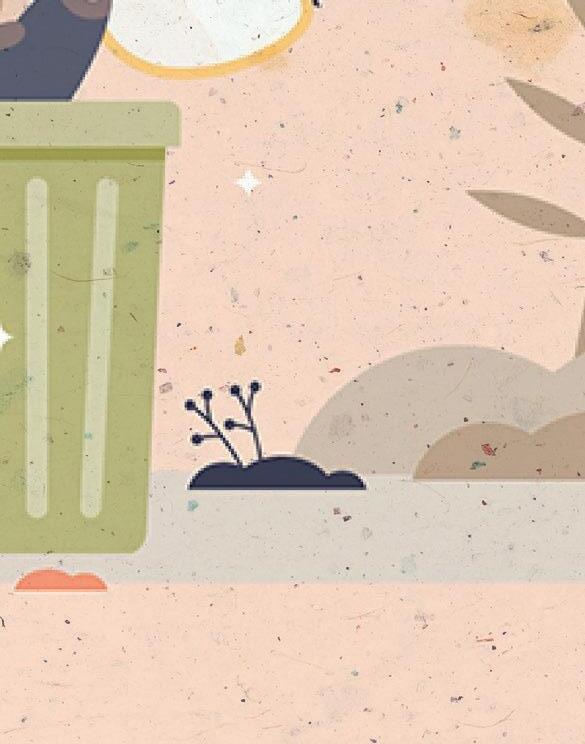





Royal Schiphol Group supports ICW lobbying efforts and has trialled better recycling systems with KLM Catering Services and Suez, a waste
recycling and recovery specialist which took recyclables directly from the aircraft for segregation and onward recycling.
Gatwick Airport has worked with DHL Supply Chain to champion on-site waste management at a dedicated £3.8m plant with a segregation centre. It turns waste, including ICW and packaging, into on-site heating and powers a water recovery system. Prior to the pandemic it treated 2,200 tonnes of Category 1 waste a year, 20% of the airport’s total, but has the capability to process around 10 tonnes a day.
Defining responsibility
Clear understanding of which parties are responsible for waste will be vital. Currently, waste management processers may pay a commission for certain waste. And where caterers are paid per tray item, business dynamics can disincentivise waste reduction.
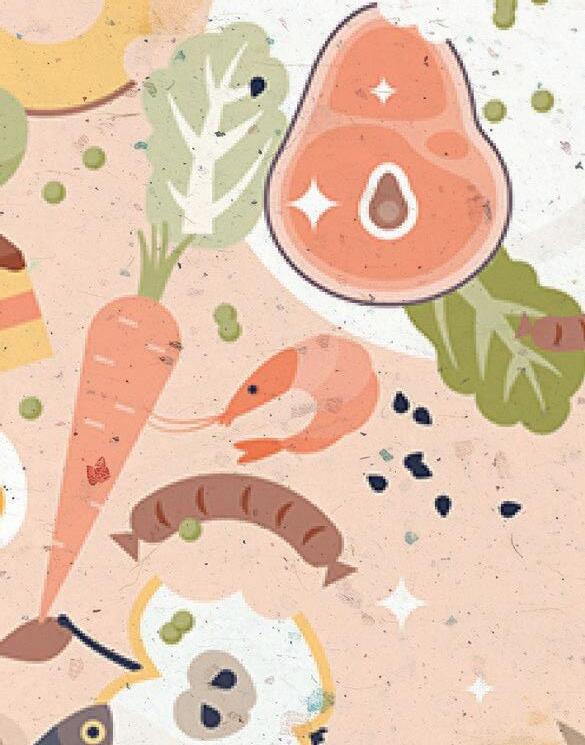


Anne de Hauw, of IN Air Travel Experience, is

CABIN WASTE onboardhospitality.com
working with experts in resource management, circular economy and energy transition to provide the susta.IN consulting service and believes technology has some answers.
Not an easy discussion
She says: “Waste is not an easy discussion, the vested interests within the supply chain do not support fast progress but we have identified some potential areas for positive change. Endof-life material streams, both inside airports and elsewhere, are currently underutilised but may be suited for a thermal/chemical process which would improve environmental performance. We also see opportunities to source plastics for advanced recycling operations to provide ethylene to the suppliers of plastics materials, and have been working with Lufthansa Group caterers, including gategroup, to progress this. We have also identified plastics suppliers and advanced recyclers in Asia who would be suitable for this.”
The ultimate win-win she believes would be to link waste recycling with Sustainable Aviation
Fuel (SAF) made using biosolids, sustainable ethanol or recovered hydro-processed esters and fatty acids (HEFA). She adds: “We have identified opportunities, particularly in North America, to work with our partners to convert lower-margin and under-performing biosolid processing operations (such as composters and surplus ethanol producers) into SAF production facilities.”
She also sees opportunities to convert endof-life materials generated at airports, such as solvents and other liquid industrial wastes, to make renewable natural gas or hydrogen for on-site energy, using existing technologies.
gategroup is developing a range of solutions, including an off-load analysis tool for airlines who want data insights into their waste, and has been investigating and testing new technologies which can process waste into material suitable for other industries such as construction, biogas, farming and composting.












New Global Head of ESG at gategroup, Yulia Bolotina, says: “We need to look for improvements all along the value chain.

Smarter ICW is crucial for our industry’s waste reduction efforts to make a real impact but there are still low-hanging



fruits we can tackle locally now – empowering the customer with data and collaborating to maximise the percentage of re- and up-cycled non-Category 1 waste, educating the passenger on how they can help, as well as designing low carbon menus for example. Sustainability needs have triggered the spark of creativity and new solutions will come as we work together. I am excited to see that.”
Packaging waste

Focused on food packaging waste, deSter points to wider trends as a steer for aviation. Philippe De Naeyer, Director Sustainability at deSter, says: "We are committed to applying circular economy principles and focusing on reusable items that minimise waste. The current shift in food retail and takeaway regulations towards reusables is a clear sign that change is needed."
He accepts the need to clean reusable items at airports brings challenges. “Nevertheless, we are confident that change is on the way, and these installations will eventually come into place because food packaging at the airports (on the ground) falls under national rules and regulations, which more and more promote reusables. We’re committed to designing reusables across the system, including matching trolley equipment and reusable lids which optimise weight, space-saving and washing for smooth handling,” says De Naeyer. He sees good existing recycling streams for cans and PET bottles but not for SUP food packaging. “This is made of various materials, but only one is suitable for closed-loop recycling (PET). Moreover, single-use plastic food packaging is often contaminated with food, making cleaning a challenge,” he explains.
As reusables cannot always be implemented yet, his team is also his team is looking into compostable packaging that can be discarded with food waste, so long as proper treatment of organic waste is available.
While ICW regulations are an obvious obstacle, De Naeyer encourages airlines and operators to focus on national waste regulations too and to look for local solutions. “Some regulations may mean efficient recycling is not always possible but we can still challenge the status quo as there are definitely opportunities today to create international standards and move forward together.” •


Europe



















Ahead of the launch of a new Brussels-Berlin night train service on May 25, Stuart Forster looks at the growing appeal of sleeper trains in Europe…


Sleeper trains are often romantically associated with First Class travel and adventures penned by novelists such as Agatha Christie and Ian Fleming. With sustainability concerns now driving many travellers’ transport choices, there is renewed interest in overnight travel on trains.
“Going to sleep in one place and waking up in another is one thing, but the idea of gliding through the countryside being rocked to sleep by the movement over the tracks has a gentle appeal as well – especially after a delicious dinner in the dining car. Plus sleeper trains have a sort of oldtime nostalgia, even though many of them are very modern with great facilities,” says Cat Jones, the founder and CEO of Byway, a travel company whose focus is flight-free travel. Research shows that 34% of passengers chose Nightjet services operated by ÖBB, Austria’s national railway, because of sustainability concerns.
“As Austria’s largest mobility provider, we are committed to a sustainable and climate-friendly transformation of our transportation system,” comments ÖBB spokesperson, Bernhard Rieder. He adds that rail travel is “by far the most environmentally friendly mode of transport” despite carbon emissions varying between operators in European countries. According to ÖBB calculations, travelling on a Nightjet service between Vienna and Paris results in 45.1kg of carbon emissions per passenger, compared to 419.6kg when flying.
New trains
ÖBB has ordered 33 new Nightjet trains and the first will enter service this year on routes between Austria and Italy. They have seven carriages, made up of two seating cars, three with couchettes and two with fixed beds, private toilets and showers. New mini cabins are designed for use by solo
40 / SLEEPER TRAINS IN EUROPE
travellers. Each Nightjet will feature a couchette compartment with an accessible toilet.
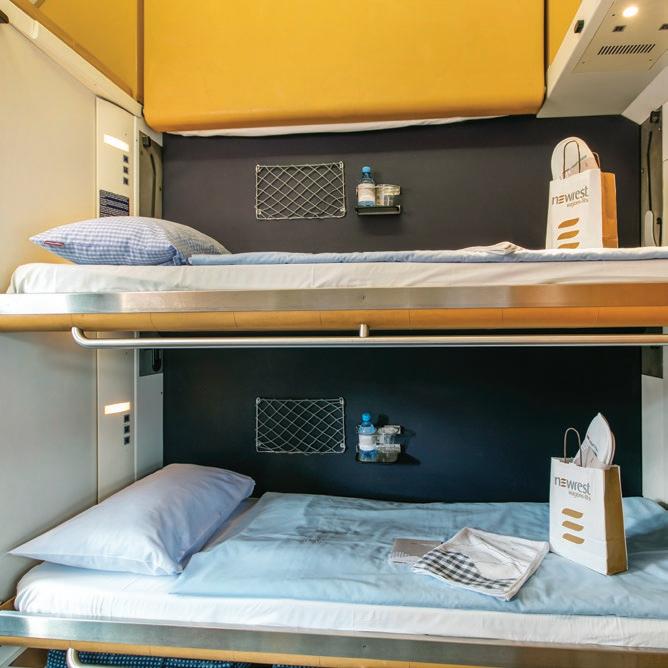
Plug sockets, USB ports and inductive charging stations are available aboard Nightjets. They offer free wi-fi and onboard entertainment is supplied via the ÖBB Railnet portal, which facilitates streaming and access to magazines and newspapers.
The move to greater sustainability aboard Nightjet services has seen paper cups replaced by porcelain and local bakeries supplying the bread rolls served for breakfast.
Similarly, the UK's Caledonian Sleeper serves food and drink sourced from producers in Scotland. And since October, refillable containers have dispensed toiletries, eliminating use of approximately 400,000 single-use plastic bottles a year, reducing virgin plastic use by 81% and liquid waste by 75%.






Private initiatives



“Sleeper trains were not empty before they were cancelled but they were loss-making,” points out Louis Lammertyn, an expert in decarbonising transport, about the previous generation of night services. He argues that state-owned operators focused on daytime services and night trains were never optimised. “It’s possible to do it way cheaper, without the inefficiencies and overhead costs of state operators,” suggests Lammertyn.

qualitative time than flying, even if the overall journey time is longer. “It’s a different time of the day. If it’s sleeping time, it’s a huge optimisation. You spent the whole day somewhere really awesome and you don’t pay for a hotel,” explains Lammertyn, pointing out that night trains negate the need for early morning airport runs and other stresses associated with flying.

Sleeper trains have a sort of old-time nostalgia
“They are coming back because we need them. People are asking for them. Every single night train line that is being opened is near to fully booked, so you can profitably operate if you have a good cost structure. There is an increase because people are aware of their carbon footprints and that they should travel more sustainably,” he adds.
Sleeper services offer people a greater sense of


That view is echoed by Chris Engelsman, one of the co-founders of the European Sleeper, who also sees the sustainability movement as being a key factor in now being the right time to launch a new sleeper train service: “It’s important that we have a dedicated company because night trains require some special attention. It’s a niche market and there are a lot of different aspects to a usual daytime train. It has bedding. It has stewards on board. It needs to serve breakfast. All these things are different and require a specialised approach. That’s why we think a dedicated railway company for night trains is very useful.
Even before the first train has pulled out of the station, plans are afoot to expand the European Sleeper's route to Prague. Travellers, it seems, are waking up to what sleeper trains offer. •


onboardhospitality.com






 From above: A passenger in a modern sleeper train cabin; couchettes aboard a night train
From above: A passenger in a modern sleeper train cabin; couchettes aboard a night train
SLEEPER
41
TRAINS IN EUROPE /
Making it shipshape
Stuart Forster learns about a recent venture by Diversey, a company that turns 100 years old this year…
Diversey was founded in 1923 and has grown into a global provider of hygiene, infection prevention and cleaning solutions for commercial businesses. With approximately 8,600 employees around the world, the company now serves more than 85,000 customers in over 80 countries.
In 2021 Diversey took a strategic decision to leverage its global footprint to become a leading cleaning and hygiene provider in the Cruise and Marine (C&M) industry. A dedicated C&M team was established, including sales, operational and training expertise.

“Our trademark is the right product, in the right place, on time. It’s possible since we have a global presence and strong distribution regional network near to C&M operations, therefore preferred solutions can be easily ordered and delivered – all from a single source,” explains Jan-Philipp Schmid, Diversey’s Global Business Development Director Cruise.
of the passengers. The passengers feel more safe when they are able to see that cruise companies are doing a lot for our safety to save us from any viruses or bacteria,” says Jan-Philipp.
the









prior to the COVID-19 pandemic, which












Infection prevention protocols were well-established in the C&M industry prior to the COVID-19 pandemic, which impacted supply chains and the global cruise industry. As a consequence, the frequency of disinfection rather than the products being used that saw
As a consequence, disinfection rather being used that saw change.
“It's much more important that we do it in front
Additionally, the number of floor stands and wall-mounted dispensers for hand disinfection has tripled aboard cruise ships. Access to wipe disinfection to clean surfaces provides additional assurance. “Diversey provides a stand-alone floor dispenser with an additional shelf for wipes which is highly appreciated both by cruise management and passengers,” adds Jan-Philipp.
“With a sustainable cleaning approach, we’re not simply operating our own















business more sustainably. We’re helping our C&M customers protect their customers while reducing their costs, improving their profitability and enhancing their public image. We’re helping them see sustainability practices as a competitive advantage,” asserts Jan-Philipp, whose company’s biodegradable SURE range is made with agro-food industry byproducts.

“In my view, in the near future buyers will look only for products that are super concentrated in fully recyclable packaging that is taking less storage and significantly contributes to the circular economy,” he predicts. diversey.com •
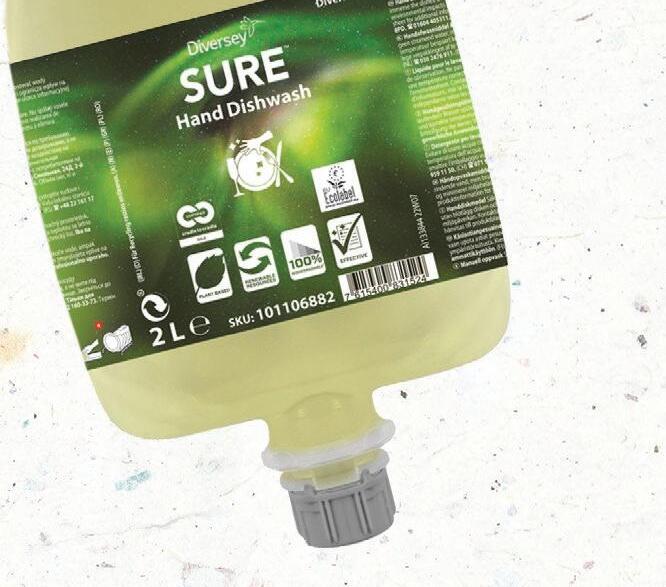

FOCUS ON
onboardhospitality.com
We’re helping our C&M customers protect their customers while reducing their costs



flight type dishwasher cart lifts tray dishwasher Warewashing systems for up to 50 000 trays/day www.wexiodisk.com www.diskomat.com DISKOMAT is your supplier of customized and professional flight catering solutions. Together with our partner WEXIODISK we supply the flight catering industry with Swedish high quality products. Contact us for more information, info@diskomat.com trolley washer Untitled-2 1 22/02/2022 09:43 Untitled-3 1 01/03/2023 10:58
Spirits in the sky


Stuart Forster talks with David Mills, who has established Sustainaholics to promote only sustainable brands in the travel industry…

he idea came to David while he was on holiday, wearing a pair of flipflops made from recycled beach plastic. Though not well known, his choice of footwear was more sustainably manufactured than the dominant brand.
“The seed of the idea was sown when I realised that the interests of the travel industry and new sustainable challenger brands are perfectly aligned because travel operators want commercially viable sustainability partnerships, their customers want product innovation and authentic sustainable brands, and these brands want more market exposure to drive growth,” he explains of the thoughts behind setting up Sustainaholics.
launched in 2022
The company entered the market early in 2022, focusing the launch on sustainably produced spirits after initially offering a broader product
tportfolio. It represents around a dozen brands, including the likes of Cooper King carbon negative gin, Two Drifters carbon negative rum and sustainably farmed rye whisky from The Oxford Artisan Distillery on an exclusive basis within the transport industry. A key notable success was winning the launch listing with Tourvest Retail Services for British Airways’ High Life Shop. Sustainaholics offers travellers opportunities to discover products from new and pioneering sustainable spirits brands providing ethical alternatives to established producers. Customers increasingly care about product provenance, packaging and a company’s Corporate Social Responsibility credentials, factoring those issues into their purchasing decisions.
Broadening perspectives
“Travel is about opening your mind and broadening perspectives. Passengers can use their journey to discover brands offering sustainable solutions, rather than only seeing the same traditional brands that have dominated the landscape for decades… Sustainaholics’ brands
44 sustainaholics
have been designed from the very beginning with sustainability at their core so offer passengers something unique,” explains David.
“Our sustainability proposition directly engages customers on a fundamental issue, providing a customer-facing platform to demonstrate a genuine commitment to sustainability through solutions-driven partnerships like ours which help travel operators grow their own brand equity,” adds the man with 20 years’ travel industry experience,
“We offer a commercially viable way to embrace sustainability. Credible independent research demonstrates that sustainable brands drive better customer engagement with higher purchase conversion at premium prices, resulting in more profits for retailers,” says David, outlining benefits for transport providers.
Gen Z’s power
He explains that the Generation Z demographic is increasingly powerful and looking for innovation from new brands with authentic sustainability credentials that can positively engage a younger generation of travellers.
“Sustainaholics provides transparent summary information, supporting every brand’s sustainability claims to help retailers determine the validity of the claims for themselves and potentially share with customers at the point of sale...we’ve declined opportunities to represent more than five times the number of brands we have in our portfolio, due to inadequately supported sustainability claims,” says David, touching on the issue of greenwashing and how retailers could be liable for misleading claims
under the Competition and Market Authority’s recently introduced Green Claims Code.

David believes that Sustainaholics offers busy buyers best-in-class brands, pushing the boundaries on sustainability under a one-stop shop solution. “Our brands are small compared to those that dominate the industry. Collectively we are larger and offer more value so have a better chance of success and can get a better deal than any brand going solo,” he points out.
“Sustainaholics offers brands a zero-risk deal and puts in all the work required to get listed. We manage the process and relationships, so brands can focus on their day-to-day business,” he adds.
Driving positive change
“Every consumer who currently buys from any brand without credible sustainability credentials and changes to one that is genuinely sustainable is making a small but positive difference,” says David about the impact of switching to sustainable brands, emphasising that everyone must leverage their influence to drive change.
“It’s important to make as many people as possible aware that these choices exist today, and the travel industry’s huge global reach... positions it to play an important part in growing ethical consumerism, which it’s currently falling a long way short of fulfilling,” says the founder of Sustainaholics.
“The opportunities for new and profitable partnerships going forwards are huge if the industry is ready and willing to embrace change,” concludes David. sustainaholics.com •
onboardhospitality.com sustainaholics / 45
We offer a commercially viable way to embrace sustainability


WHERE CABIN CONCEPTS TAKE OFF Join us in Hamburg from June 6 - 8, 2023. Aircraft Interiors Expo is the definitive marketplace where everyone involved in developing cabin interiors needs to be. Visit us at: https://www.aircraftinteriorsexpo.com/obh Co-located with: Organised by: In co-operation with: EXPO Aircraft Interiors HAMBURG,GERMANY 6 - 8 JUNE 2023
Chief Trash Officer appointed
United Airlines chooses Sesame Street star. Rubbish-loving Sesame Street star Oscar the Grouch has been appointed as United's first Chief Trash Officer as part of a consumer education campaign to promote the benefits of wider use of susainable aviation fuel (SAF). He appears in 30 pieces of original content.

"The campaign provided a special opportunity to showcase to showcase an iconic Sesame Street character, Oscar the Grouch, celebrating what he loves best – trash," said Jennifer Ahearn, Vice President, Global Strategic Partnerships and Themed Entertainment, Sesame Workshop. "The amazing collaboration helps United Airlines explain in simpler terms the technology of turning trash into fuel in fun and engaging manner." united.com
Emirates recycles more than 500,000kg of plastic and glass


The 2022 total weighs the same as a fully-loaded A380 aircraft. The airline's glass and recycling initiative began in 2019 in response to a suggestion by environmentally-concious members of its cabin crew. Separated glass and plastic are sent to a recycling plant in Dubai. The initiative diverts waste from landfill. The recycled plastic is cleaned, chopped into flakes and melted into pellets that are used by manufacturers to make other plastic products. Likewise, the glass is reused by manufacturers in the United Arab Emirates. The weight of glass and plastic recycled in 2022 was comparable to one of the airline's flagship aircraft. emirates.com














deSter joins UN initiative LSG Group commitment New IFE system
Becomes Global Compact member
Launched in 2000, the UN Global Compact is the world's largest corporate sustainability initiative. It is active in more than 160 countries, involving over 15,000 companies and 3,800 non-business signatories. dester.com

Animal-friendly egg supply target
LSG Group has pledged to make its enitre egg supply chain cage-free by 2025.
It is working with Mercy for Animals to help partners and suppliers find alternatives to eggs from caged hens. lsg-group.com
Bhutan Airlines announcement
Wireless IFE aboard Bhutan Airlines' aircraft will offer movies and TV shows, music, podcasts, games and reading material. Passengers will be able to access the system through their personal electronic devices. bhutanairlines.bt
onboardhospitality.com INDUSTRY UPDATE / 47 Top stories from across the industry
Sustainable dishwasher launch










Wexiödisk has introduced the new WD-BS flight-type dishwasher. The S-Range features innovative functions such as ECO-FLOW, which converts energy and steam during washing, transferring them to incoming cold water via a heat recovery unit. HEAT-FLOW prevents starch and proteins from sticking to dishes, pre-heating the rinse water.


"The WD-BS has been designed and developed with sustainability in mind. It uses significantly less water and detergents than its predecessor. The dishwasher recycles wastewater, which is being used fro controlled pre-rinsing, saving water, energy and labour," said Thomas Jamtänder, Marketing Director – Flight Catering Solutions at Diskomat, which represents Wexiödisk in the global flight catering market. diskomat.se




Bottega launches a lemon spritz canned drink
A ready-to-drink single-serve cocktail
The Italian wine producer has created a refreshing drink from Bottega Gold Prosecco and Limoncino.
Korean Air upcycles life vests
Limited edition upcycled cosmetic pouches. Four thousand cosmetic pouches have been created from retired life vests in collaboration with the Korean brand 107, which is renowned for its holistic, eco-friendly approach to beauty care.

Each of the numbered pouches carries six travel-size skincare products from 107. The edition number is imprinted on a metallic tag that also bears the total number of pouches made as part of this upcycling initiative. Each pouch features a red inflate tag and a black fabric handle.
The pouches are avialable for purchase via Korean Air's e-Skyshop and profits will be donated to a global environmental organisation. koreanair.com
St Gallen specials
























Gourmet meals on SWISS
The introduction of the canned drink follows a trend that has seen a growing number of pre-mixed drinks become available in a ready-to-serve form.
Bottega was established in 1977 and is based 50km north of Venice. The company's winery is located in the the Prosecco DOC region of northern Italy. bottegaspa.com
The 'SWISS Taste of Switzerland' inflight culinary programme introduced meals inspired by the cuisine of the canton of St Gallen. The dishes are designed by Michelinstarred chef Bernadette Lisibach. swiss.com
onboardhospitality.com 48 / INDUSTRY UPDATE Top stories from across the industry
Dina Foods QR codes
QR codes share recipe ideas
New sourdough and oregano variants have been added to Dina Foods' Paninette flatbreads range.


New-look packaging makes use of QR codes to share ideas about how to use the Lebanese-style flatbreads. dinafoods.com
Safran seats for Qantas flights

Seating for Airbus A350-1000 fleet revealed. Safran seats will be used in Business and First class cabins aboard the Australian flag carrier's new aircraft, which are capable of flying from airports on Australia's east coast to destinations in Europe and North America.
Designed in conjunction with Caon Studios, for use by passengers on flights with a duration of between 18 and 22 hours, Safran's Unity seats are ergonomically designed for high levels of comfort.
"We are delighted to provide Qantas with seats that meet the needs of ultra-long-haul flights and which allow a comfortable journey for all passengers," said Victoria Foy, CEO of Safran Seats, praising the collaboration between Qantas and Safran Seats teams based in the United Kingdom. safran-group.com
Air New Zealand partners with Touch Inflight Solutions
New Zealand's flag carrier has appointed Touch to provide inflight entertainment and connectivity.

The technologies being delivered include ABOVE, the first cloud-based media distribution platform.
"We at Touch are humbled, proud and very much looking forward to developing a strategic partnership with Air New Zealand, and support the customer-centric and digital focus that we all as passengers have been exposed to with their service," commented André Valera, Touch's Vice-President of Business Development. touch.aero
CBE for John Caulcutt
New Year's Honour
The co-founder and Director of Plane Talking Products was named a Commander of the Order of the British Empire (CBE) in recognition of his philanthropy and services in raising funds for charities. planetalking.net
Moomin makeover
Characters on Finnair A350s
To mark the 100th anniversary of Finnair, Moomin characters will feature on two of the airline's aircraft throughout 2023.
Moomins were last seen on Finnair's livery in the mid-1990s. finnair.com
onboardhospitality.com industry update / 49 Top stories from across the industry
Meeting at Hamburg's Messe
WHAT: WTCE
WHERE: Hamburg
WHEN: June 6-8 2023
Returning to the Hamburg Messe on June 6-8 2023, the World Travel Catering and Onboard Services Expo, usually known simply as the WTCE, will attract more than 150 global airlines and many suppliers of onboard products.
With numerous products being showcased, including those from around 100 new exhibitors, it is recognised as one of the industry's premier networking opportunities. More than 750 VIPs from airline and rail companies will be among the 5,000 or so participants in the WTCE.
Taste of Travel Theatre sessions over the three days mean opportunities to learn from the industry's thought leaders. Free to attend, they mean opportunities to view chef demos and discover insights into emerging trends. The winners of the 2023 Onboard Hospitality Awards will be revealed in the theatre on the evening of Tuesday June 6.
Over the same three days, the Hamburg
Fine dining
Messe will also host the Airport Interiors Expo (AIX). That means opportunities to meet with more than 600 industry exhibitors, over 1,000 aviation products and services plus 12,000 attendees from around the world. worldtravelcateringexpo.com
Flying high
CALENDAR
MAY 12-14
Cruise Lines International Association Conference 2023, Southampton cruising.org
MAY 16-17
SmartRail Europe 2023, Brussels smartrail-europe.com
MAY 23-25








WHAT: Speciality & Fine Food Fair

WHERE: London
WHEN: September 11-12 2023
The Speciality & Fine Food Fair provides an opportunity for independent suppliers, buyers importers, distributors and wholesalers to network and get up-todate with the latest trends. Hundreds of artisanal producers and suppliers of food and drink will attend to display new products at an event which typically attracts approximately 10,000 industry buyers. specialityandfinefoodfairs.co.uk
WHAT: Aviation Festival Americas
WHERE: Miami
WHEN: May 16-17 2023

Taking place for the 15th year in succession, the 2023 edition of the Aviation Festival
Americas will feature 11 dedicated conference tracks with over 300 speakers. The two-day event will be held at Miami Beach Convention Center and draw more than 2,500 attendees, including executives from some of the biggest airlines. terrapin. com/conference/aviation-festivalamericas.uk
Future Travel Experience - EMEA, Dublin futuretravelexperience. com
SEPTEMBER 8-10
Hamburg Cruise Days, Hamburg hamburgcruisedays. de
SEPTEMBER 19-21





APEX/IFSA 2023 with FTE Global, Long Beach ifsa-apex.aero
onboardhospitality.com


50 / EVENTS
A World of Inspiration




to enhance the onboard experience
350 suppliers











750 VIP onboard buyers
4,900 attendees
1000s of inflight catering, passenger comfort, onboard services and products

Find out more at: worldtravelcateringexpo.com/obh1







Sustainable Wellness at 35,000 feet

From amenity kits to dinnerware products, we specialize in connecting you with eco-conscious products and brands that are valued by today's travelers.







Sustainably Sourced Material








































Interested in learning more? Come see us at WTCE in Hamburg June 6-8. Please email us at info@wessco.net to make an appointment.











































































































































































































































































































































































































































































































































































































































































































































































































 Clockwise: European river cruising is growing in popularity; An elegant ship interior; Stateroom aboard a Sea Cloud vessel
Clockwise: European river cruising is growing in popularity; An elegant ship interior; Stateroom aboard a Sea Cloud vessel





















































































































 From above: A passenger in a modern sleeper train cabin; couchettes aboard a night train
From above: A passenger in a modern sleeper train cabin; couchettes aboard a night train















































































































































